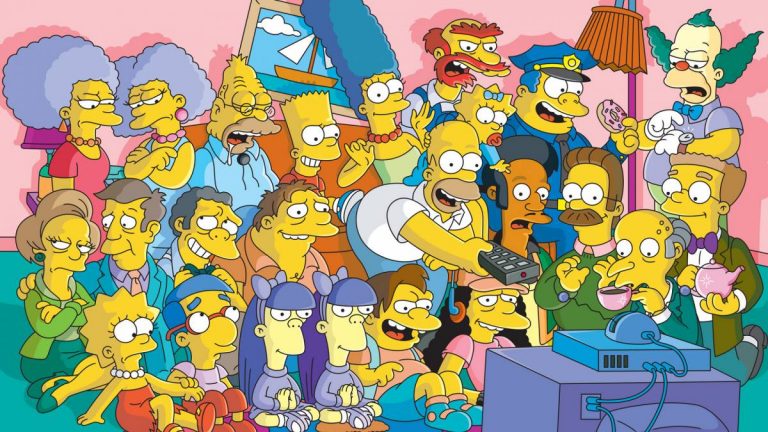For three decades The Simpsons has entertained countless viewers globally of all ages with its ingenious satire of American society, unashamed stereotypes of everything from rednecks to elderly billionaires, and heartwarming depiction of family and friendship.
Throughout the last 30 years, they have also moved us with poignant moments of character-driven drama, and have dealt with serious issues. It is the longest running primetime scripted series of all time and, with Season 32 having been green-lit earlier this year, The Simpsons is on track to have over 700 episodes under its belt by Spring 2021.
Its output has been enormous and, as such, there are going to be some episodes that stand out more than others, whether because of their screenplays, their guest stars or their significance to the series as a whole.
To mark 30 years of The Simpsons, here are its 30 best episodes in chronological order, although do note that this list will not contain any Treehouse of Horror episodes, as that is such a long-standing and good quality tradition that those episodes merit a list of their own.
1. Season 2, Episode 1: Bart Gets an F
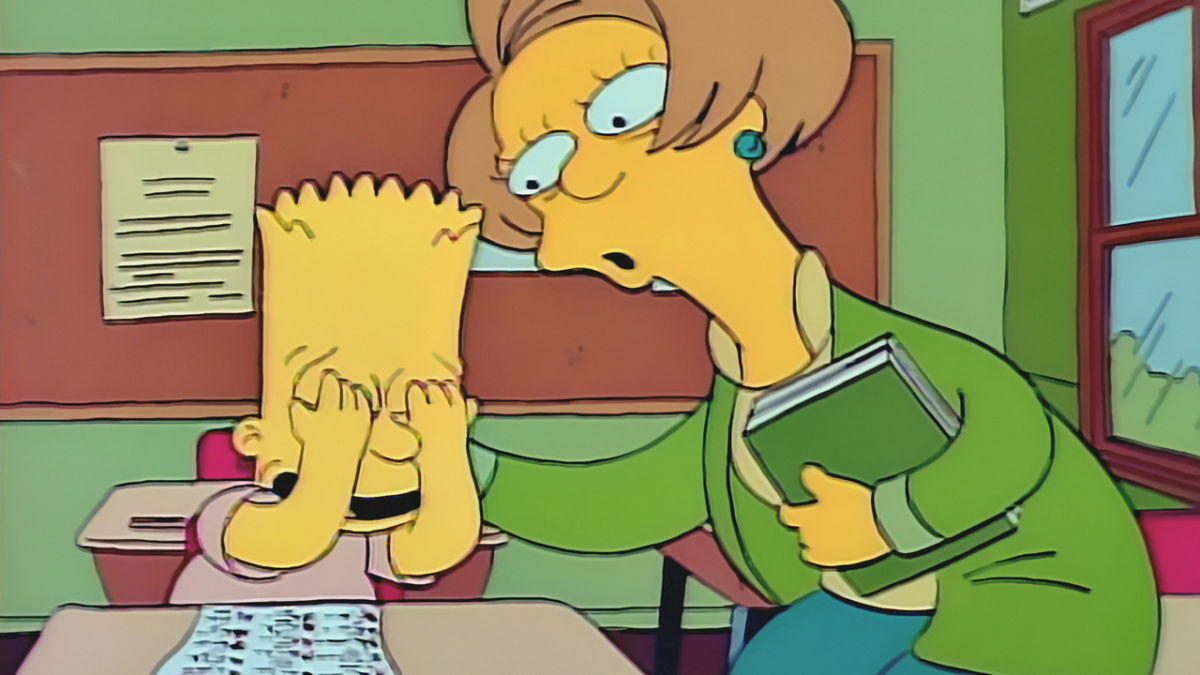
Season 1 featured more in the way of character-driven drama than comedy, and it took the entirety of Season 2 to break that and achieve a more fine-tuned balance. You may be wondering then why Bart Gets an F is on this list, given that it feels more like a Season 1 episode (bar the crisper, more detailed animation). The answer is this – it is a character-driven drama that brings far more depth to Bart than Season 1 did. While Season 1 established that Bart struggles academically, this episode showed him feeling genuinely inadequate next to the highly intelligent Lisa for the first time and disheartened by a series of Fs.
It adds a real sense of vulnerability and a new layer to the little troublemaker, with Bart’s sadness and sense of inferiority over his academic abilities able to resonate with any viewer who struggled in school. Despite being quite a heartbreaking episode, the moment where Bart realises that he has finally passed a test is truly heartwarming, and there are some good gags – namely a montage that sees Bart turn teacher’s pet Martin into a bit of a rebel, and his reaction to learning that he had passed. Not only is this one of the best Bart-focused episodes, but it foreshadowed just how nuanced a dynamic he and Mrs. Krabappel would go on to have, while also paving the way for the new (and greatest) era of The Simpsons.
2. Season 2, Episode 11: One Fish, Two Fish, Blowfish, Blue Fish
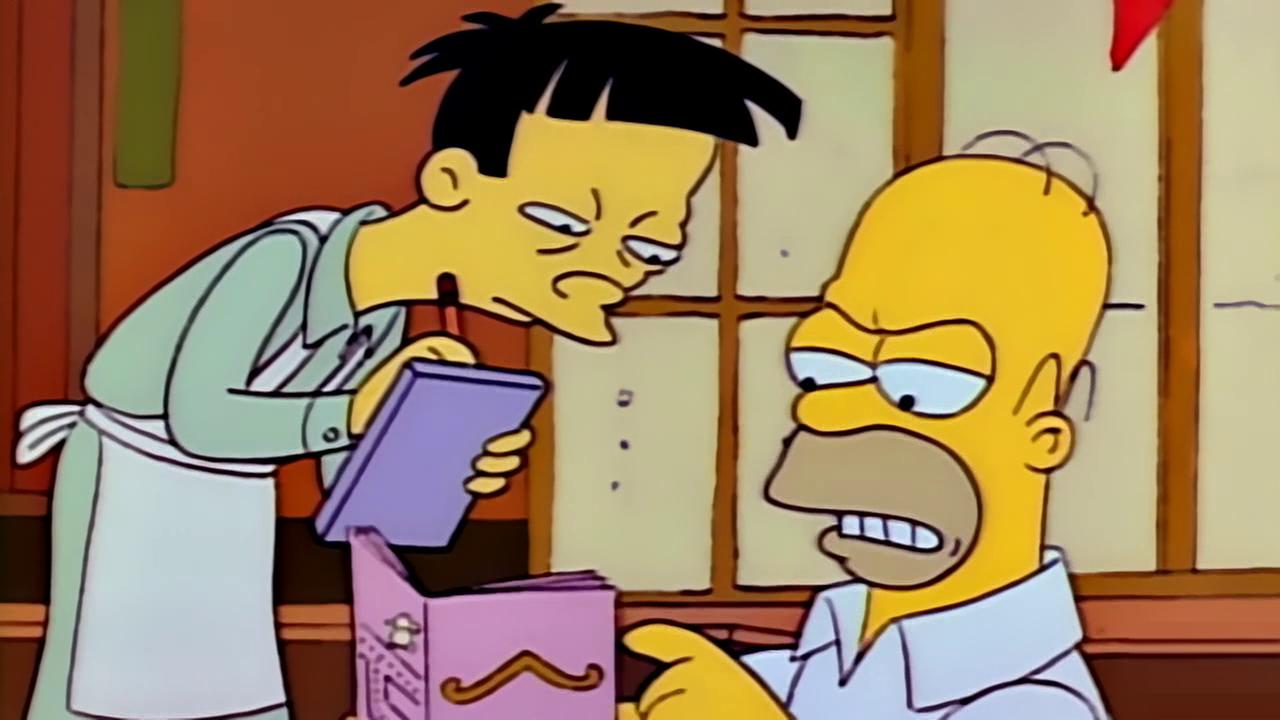
Initially this episode starts out as an amusing tribute to the limited cultural experiences of the typical American nuclear family, as Homer reluctantly agrees to try out a new sushi restaurant after Lisa’s nagging wears him down. The episode then becomes a great early example in the series of the stereotyping of foreign cultures (in this case Japan) – the neon sign with sumo wrestlers, the passionate chopping of sushi, and a brief but enjoyable guest turn from Star Trek veteran George Takei as waiter Akira. From there, this episode becomes a heartbreaking piece of character-driven drama mixed with light-hearted humour as it is believed that Homer has eaten poisonous fish and only has 24 hours left to live.
Homer tries to complete a to-do list in a series of light-hearted and highly amusing (supposed) final deeds, from his interrupted efforts to make a video tape for baby Maggie, to his over-the-top efforts to teach Bart how to shave, to his father-son bonding time with Grampa. These are fun moments that are tinged with poignancy, which are some of the all-time greatest examples of how Homer is ultimately a good man who cares deeply for his family, even if he does not always show it externally. His (supposed) final trip to Moe’s also resonates today – in an era where men are being encouraged to stop suppressing their feelings, Homer telling Moe and his fellow barflies that he loves them while he still can has real gravitas and feels especially relevant. Homer’s goodbyes to Marge and his kids are heartbreaking to watch, which is later contrasted truly well by a very uplifting resolution. By the end of the episode, the viewer has been on an emotional rollercoaster which testifies to just how good the screenwriting of the early seasons was – nuanced, clever, hilarious and capable of inducing both tears of sadness and tears of joy within the space of minutes.
3. Season 3, Episode 3: When Flanders Failed
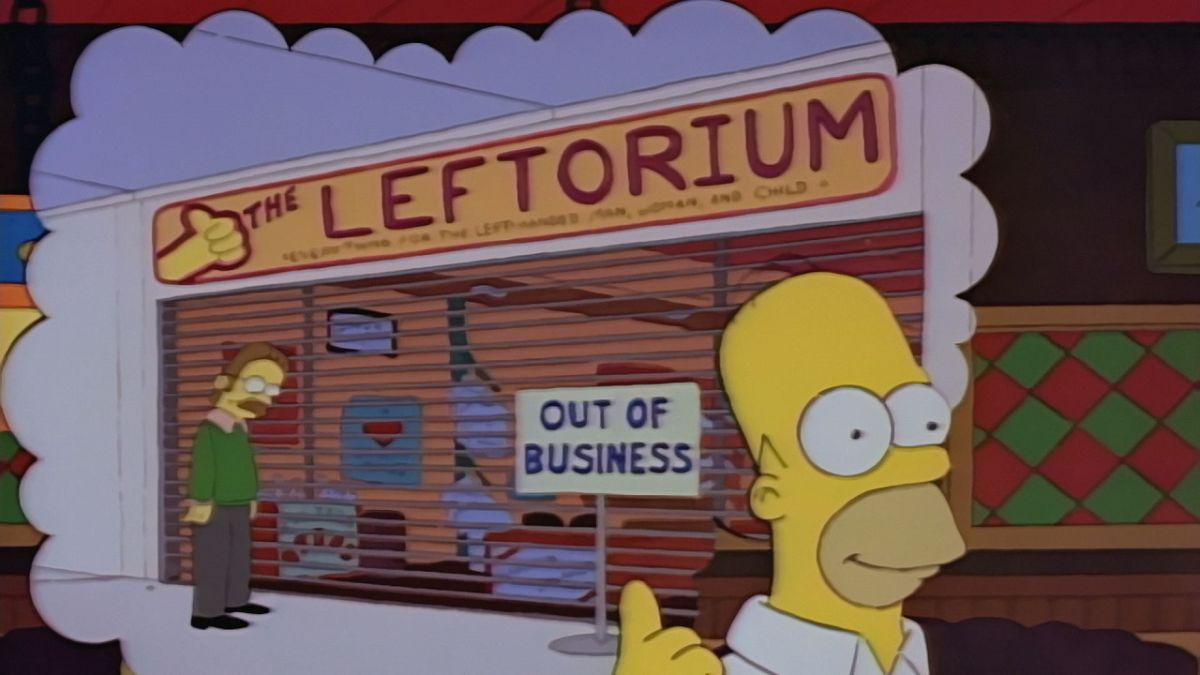
The Simpsons’ next-door neighbour Ned Flanders had been featured regularly since the pilot, with Homer regularly trying to outdo him. By Season 3 it was assumed that Homer genuinely despised the man who seemed too good to be true but was just too polite to say it outright. This episode, however, completely changed their dynamic. Homer wishes upon pulling a wishbone at Ned’s barbecue that his new business would fail. When the Leftorium (a shop for the left-handed community) does indeed fail, Homer becomes racked with guilt and remorse and goes about trying to undo his mistake and give Ned hope.
There is a lot of emotional weight to this episode – to see the usually super-upbeat Ned so broken is harrowing, while there is nothing funny about Homer’s gradually increasing sense of guilt and remorse, the culmination of which emphasises that he is not a bad man, he just makes bad (and rash) decisions. When Flanders Failed also fleshes out their dynamic very well, establishing that Homer does not actually hate Ned, that deep down he cares for his neighbour and will be there for him when the need arises. This ultimately set the tone for future Ned-focused episodes and cemented their dynamic as one of the series’ finest. There is still humour in this episode though. Bart drops out of karate classes as he does not want to learn the theory, but pretends to be flourishing as a master of the martial art. We spend the episode waiting for his lies to come back to bite him in the butt, and they do so in hilarious fashion, warning younger viewers of the consequences of lying.
4. Season 3, Episode 6: Like Father, Like Clown
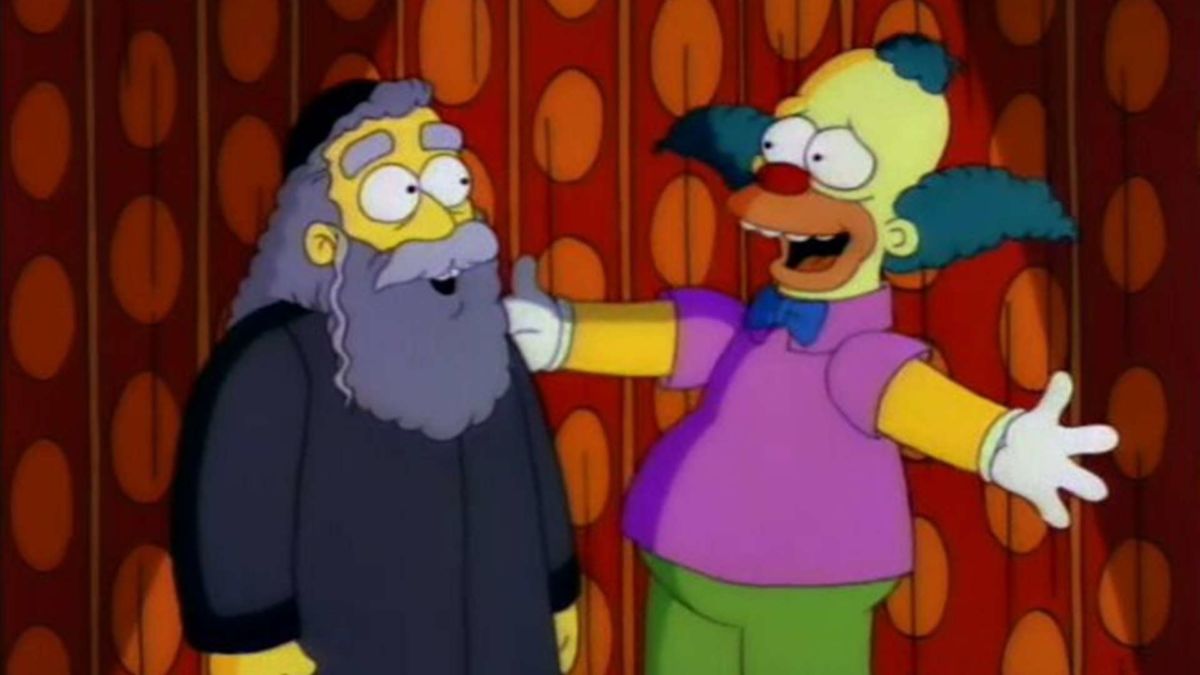
Since the Season 1 episode Krusty Gets Busted, Krusty the Clown had not had a major role in any Simpsons episodes, the events of Krusty Gets Busted having been largely forgotten about. The first of two Season 3 episodes to follow on from those events, Like Father, Like Son is a parody of The Jazz Singer which begins with Krusty having dinner with the Simpsons to thank Bart for exonerating him of armed robbery charges. At dinner, Krusty reveals that he is in fact Jewish (“A Jewish entertainer? Get out of here!”) and the son of a Rabbi, who disowned him in his youth for wanting to pursue a career in clowning. Krusty has never gotten over this, so Bart and Lisa decide to help the two reunite.
To give supporting characters a background story is important in television as it brings extra weight to them, and Krusty is no exception. Later episodes show his struggles with addiction and his self-destructive tendencies, the roots of which can be traced back to this episode. This episode feels particularly relevant today as it emphasises that outward appearances can be deceiving and even a clown can struggle with mental illness, which society today has become all too aware of. It’s not all gloom though, as Bart and Lisa’s search for Rabbi Krustofski emphasises their kindness and compassion, while the eventual father-son reunion is truly heartwarming. Furthermore, guest star Jackie Mason won a well-deserved Emmy for his role as Rabbi Krustofski, bringing a real sense of wisdom to the Rabbi, and also contrasts well the character’s sense of stubbornness with his sense of warmth.
5. Season 3, Episode 15: Homer Alone
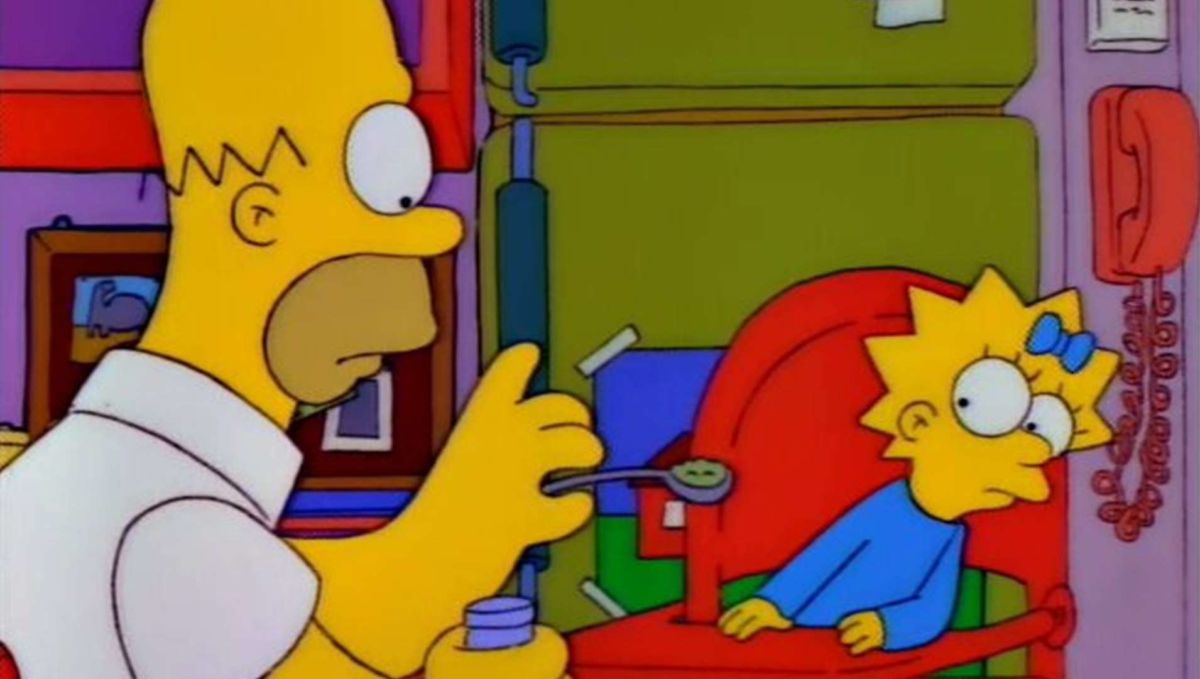
One thing that you do not realise until you are an adult is just what an unsung hero a mother can truly be. Most mothers will have a seemingly endless to-do list for both their children and their husband, who often seem oblivious to just how much time it takes to make a house a home and do everything that needs doing for the spouse and children. Homer and the kids learn this the hard way when their excessive dependency on Marge causes her to have a mental breakdown. She goes away to a spa, leaving Bart and Lisa with Patty and Selma, and Maggie with Homer.
Homer Alone is carried by a deft blend of drama and humour. Marge’s breakdown is pretty intense viewing and it is quite shocking to see the usually headstrong matriarch so beaten down and broken. Yet there is a lot of amusement to be had later on in the episode. Homer’s efforts to look after Maggie are hugely entertaining to watch and serve as a clever comment on how looking after an infant is far harder than people think. The message of this episode is clear – never take your family for granted, especially your mother, as managing without them is far harder than you could imagine. A simple message, yet an important one that everyone needs to remember, best emphasised when a dishevelled Homer and the kids reunite with a relaxed and fully recovered Marge at the end of the episode.
READ NEXT: Best Slasher Movies of All-Time You Should Watch
6. Season 3, Episode 17: Homer at the Bat
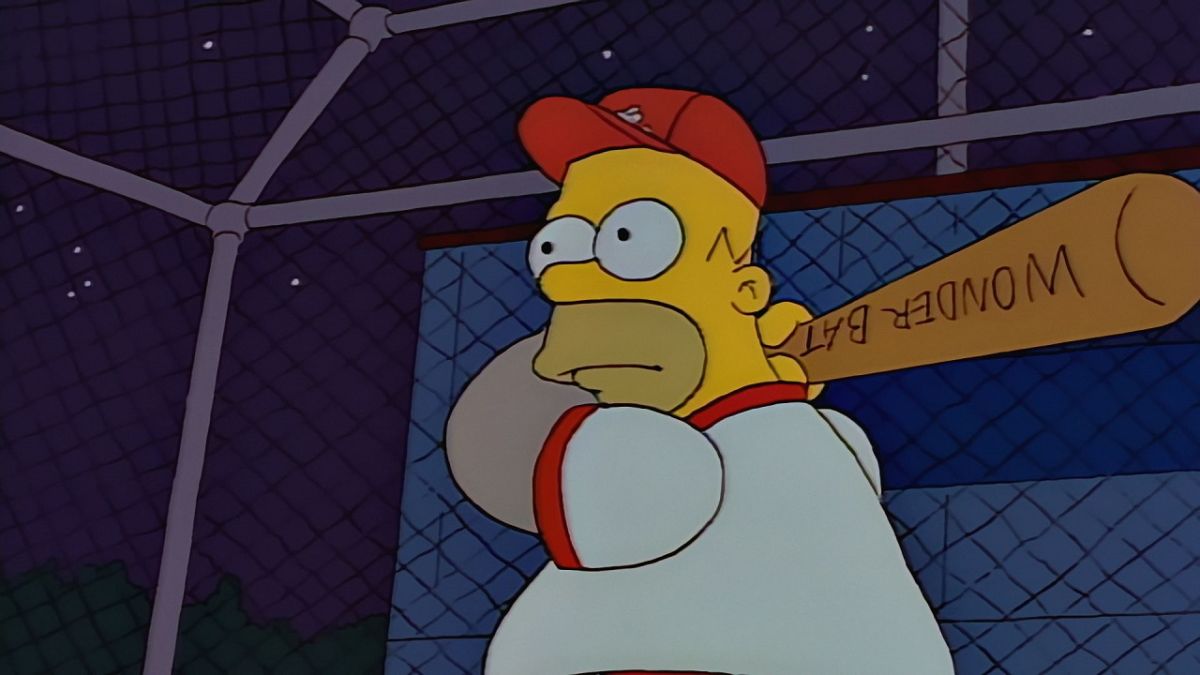
A great way of bringing people together is to play sport, and Homer at the Bat sees the Simpson patriarch prove to be a great softball player for the Springfield Nuclear Power Plant team with his homemade Wonder Bat. Confident in his team winning the season, Mr. Burns bets Aristotle Amadopolis $1 million that his team would beat Shelbyville Nuclear Power Plant’s team. To guarantee a win, Burns hires nine Major League players (all voiced by themselves) to work at the Plant and they all join the team. However, nobody can predict just what kind of incidents the professionals will get themselves into before game day.
Homer at the Bat proves that a sitcom episode can feature as many as nine celebrity guest stars and also boast excellent screenwriting. The softball games are well-paced and the camaraderie of the Nuclear Power Plant’s team is really endearing and quite infectious, while the nine Major League stars each have a reason to be there and bring something different to the table. Plus the differing ways in which eight of them become unable to play just before the final are absurdly brilliant. For example, Wade Boggs gets knocked out by Barney Gumble while debating British politics, Steve Sax randomly gets jailed for every unsolved murder in New York, and Ozzie Smith disappears in the Springfield Mystery Spot. Throw into the mixture Burns showing an early sign of senility by telling Don Mattingly to shave off non-existent sideburns, and a simple yet brilliant slapstick gag at the very end, and you have one of the most memorable Simpsons episodes to date.
7. Season 4, Episode 2: A Streetcar Named Marge
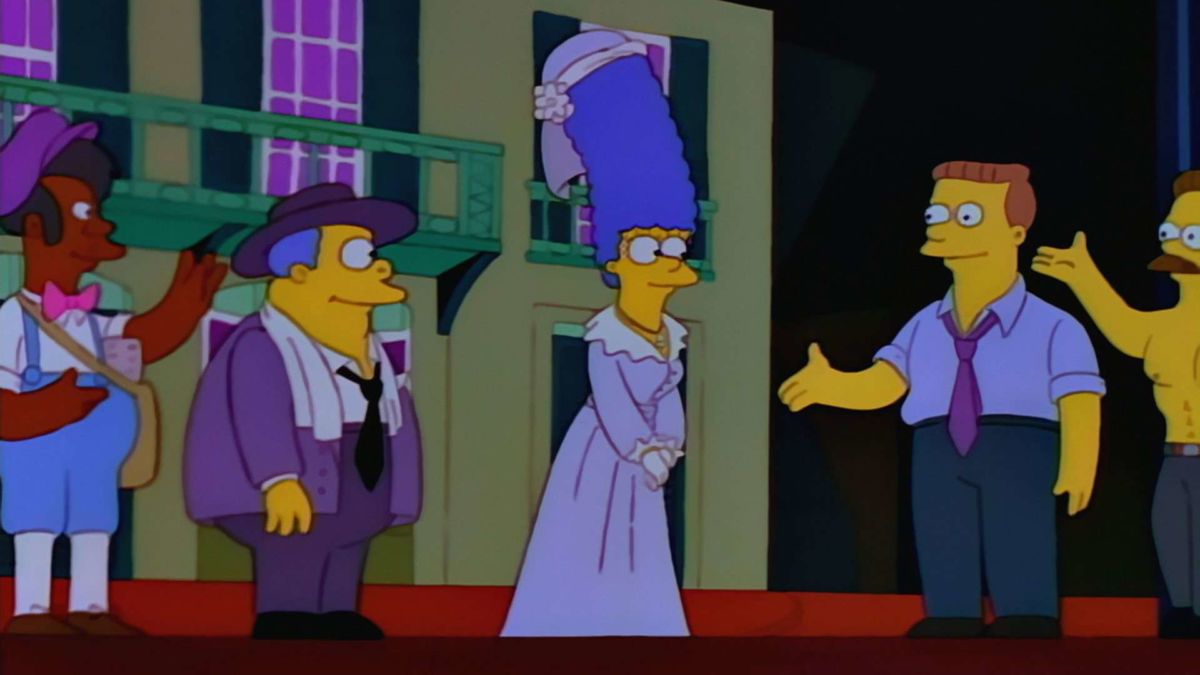
Anyone who knows their theatre or their Marlon Brando films would be able to hazard a guess at the plot of this episode. Marge joins a musical production of A Streetcar Named Desire and does a brilliant job of playing Blanche DuBois, channeling the frustration and resentment that she feels towards Homer and his neglectful ways. The screenwriting here is terrific, and it is quite emotional to watch Marge and realise just how downtrodden she is, while the moment where she first really channels her emotions is pretty darn intense. There is a lot of humour to be found too, thanks to guest voice Jon Lovitz perfectly capturing the campness and theatricality of a stereotypical theatre producer as Llewellyn Sinclair. However, this main plot is also very heartfelt. We feel sorry for Marge due to Homer’s neglectful and selfish attitude, but there is a poignancy to the moment where Homer realises the error of his ways, humbling himself as he asks Marge for forgiveness, reminding the viewer that, despite his obvious faults, he is not a bad man and that he dearly loves his wife.
A Streetcar Named Marge also features a terrific subplot. Maggie goes to a daycare centre run by Llewellyn’s sister (also voiced by Lovitz, who encapsulates well the prim and proper mannerisms and viewpoints of a stereotypical nanny). However, all of the babies have their pacifiers taken and Maggie leads a revolt, a mission to reclaim their beloved pacifiers. This subplot is a brilliant parody of The Great Escape which utilises the iconic theme music in the crawl through an air vent (which recreates the tunnel sequences), and when Maggie spends time in solitary confinement a la Steve McQueen. It is brilliantly choreographed, while the expressive character animation negates any need for dialogue, and this is one of several instances from early seasons which emphasise that there is more to Maggie than just a baby. Even if this was the main focus of the narrative then it would merit the episode a place on this list for its sheer ingenuity.
8. Season 4, Episode 3: Homer the Heretic
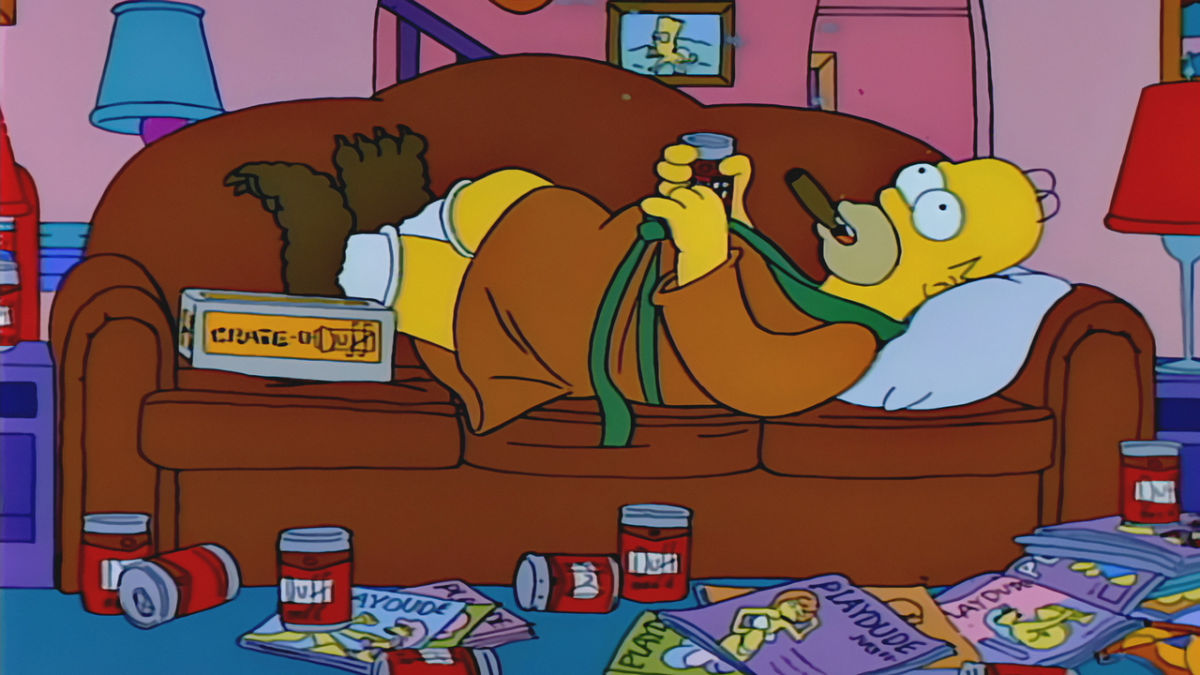
Homer does not have a great relationship with Springfield Church, we learn that in Season 1 when Homer spends a sermon listening to a football game via headphones and a portable radio. However, this episode sees that cavalier attitude peak when Homer decides to stay home during a snowy Sunday instead of going to church. He begins to do this every Sunday, becoming ever more lazy and selfish, which leads to Marge worrying about the example that he is setting the kids, and Reverend Lovejoy and the Flanders family trying to get him back into the flock.
Homer the Heretic is another great example of The Simpsons doing satire, this time satirising the persistence of religious zealots, and doing so without going for the obvious target (Jehovah’s Witnesses). Instead it is the persistence of the Flanders family that embodies this biting satire, their determination to get Homer back to church culminating in a thrilling and absolutely hilarious car chase through Springfield. The physical comedy of this chase is followed up in the episode’s climax, as the repercussions of Homer’s lazy ways result in some hilarious physical comedy as Ned saves Homer’s life. However, there is also a lot of level-headed character-driven drama to this episode, as Marge is caught between a rock and a hard place – she has always wanted Homer to spend time with the kids and be a role model to them, but she does not want the kids to be influenced by Homer’s new lifestyle. The heart of the episode is ultimately at the end, when Homer realises how much his family and fellow Springfield residents value him, and that you can be friends with people despite differing views – a great message to convey to viewers.
9. Season 4, Episode 10: Lisa’s First Word
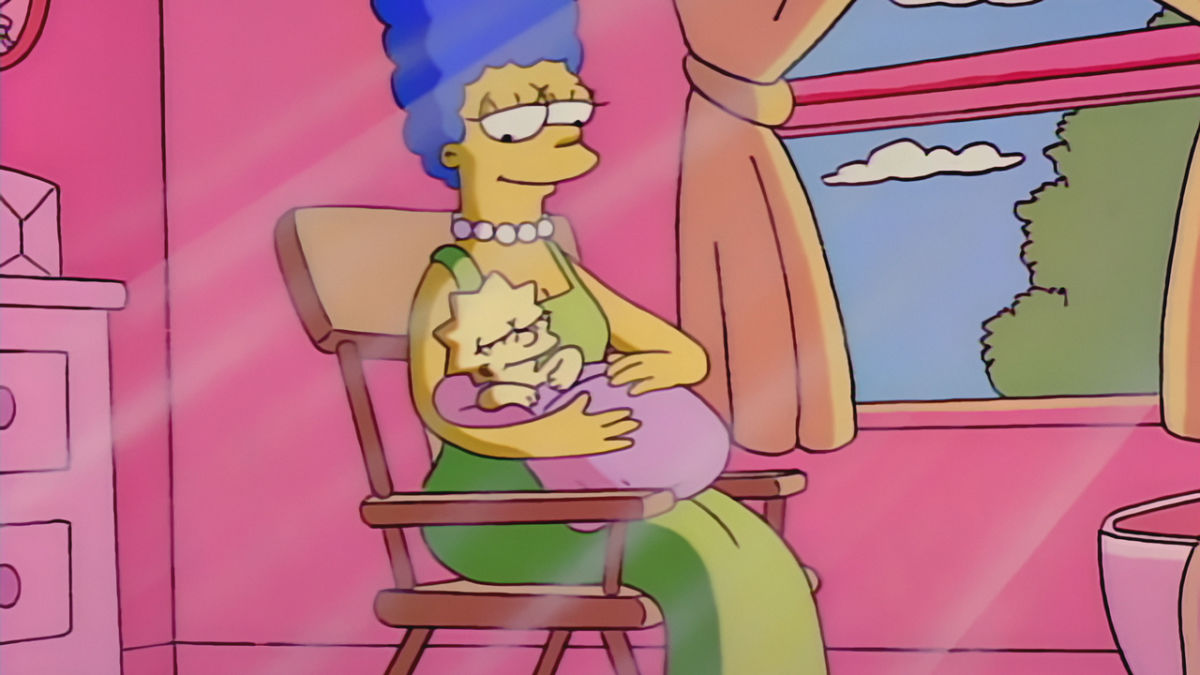
By the time that Season 4 began, The Simpsons was no stranger to a flashback episode, having done two very good flashback episodes that focused on Homer and Marge’s backstory in Seasons 2 and 3 respectively. A number more have been made since, but Lisa’s First Word is easily one of the best ones. While trying to get Maggie to talk, Lisa gets Homer and Marge to tell the story of her first word, which her parents do, the starting point being the time that they found out that Marge was pregnant with Lisa, and they also detail how Bart reacted to becoming an older brother.
Boasting clever references to the 1980s (including the M*A*S*H finale, Pacman and Chariots of Fire), Lisa’s First Word is a hilarious, yet touching episode. It answers the question of when Bart first became a trouble-maker brilliantly, depicting the 18-month-old deliberately flushing Homer’s wallet and keys down the toilet, while Maggie’s outsmarting Homer in the present-day is very well executed. And let’s not forget the inspired, yet quite disconcerting imagery that stems from showing two-year-old Bart’s fear of clowns from his perspective.
The real heart of the episode, however, comes when Lisa says her first word to a resentful Bart – his name. Seeing little Bart’s joy at realising that Lisa loves him is heartwarming and leaves the viewer feeling touched as they see the (at times deep-down) loving bond between Bart and Lisa become cemented at an age that they now cannot remember. And, just in case your heartstrings had not already been pulled at, then the moment when Maggie speaks (in secret) for the first time is sure to.
10. Season 4, Episode 12: Marge vs. the Monorail
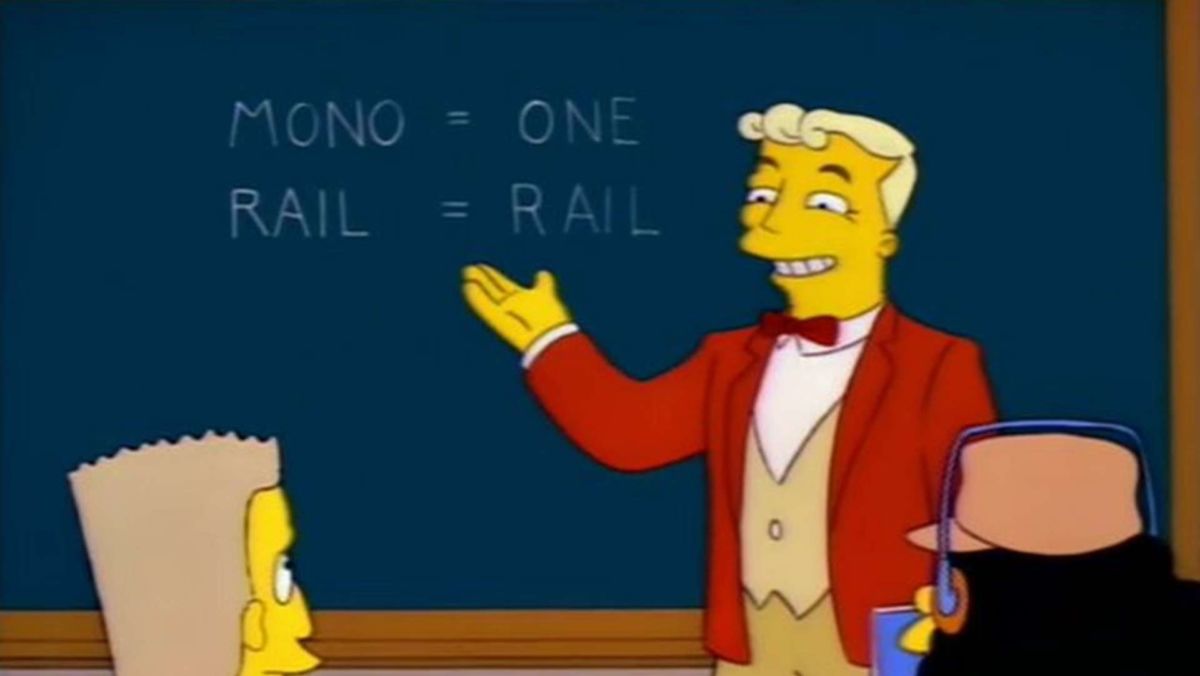
Marge vs. the Monorail is a prime example of an episode that does everything that the series is known for brilliantly. The episode opens with a terrific parody of The Flintstones in Homer’s journey from work, before moving on to the main plot. After Mr. Burns is fined $3 million for crimes he absolutely did commit, a town meeting is called to decide how to spend the money. A fast-talking salesman called Lyle Lanley turns up there randomly and convinces them to build a monorail. Homer qualifies as a monorail driver, but Marge discovers evidence that Lanley and his monorails are a sham designed by a conman, so it becomes a race against time to stop the faulty monorail from killing everyone aboard.
The screenwriting is fast-paced and very sharp, boasting rich humour and everything that perfectly embodies why The Simpsons became so popular. There is a terrific musical number which Lanley uses to sell the monorail, and that number is how Lanley became an all-time great one-time character, voiced with real charm, charisma and energy by the great recurring guest star Phil Hartman (who regularly featured as Lionel Hutz and Troy McClure). The narrative is a biting satire of the persuasive power of a fast-talking, charismatic salesman and the naivety of easily duped townsfolk and politicians who want to live in a famous and progressive town, while the fast-paced climax is a truly hilarious slapstick sequence. Throw into the mixture some visually surreal moments (a squirrel with laser eyes, say no more) and a wonderfully absurd guest appearance from Star Trek’s Leonard Nimoy, and Marge vs. the Monorail really is one of the all-time best Simpsons episodes.
READ NEXT: Best Gangster Movies of All-Time
11. Season 4, Episode 15: I Love Lisa
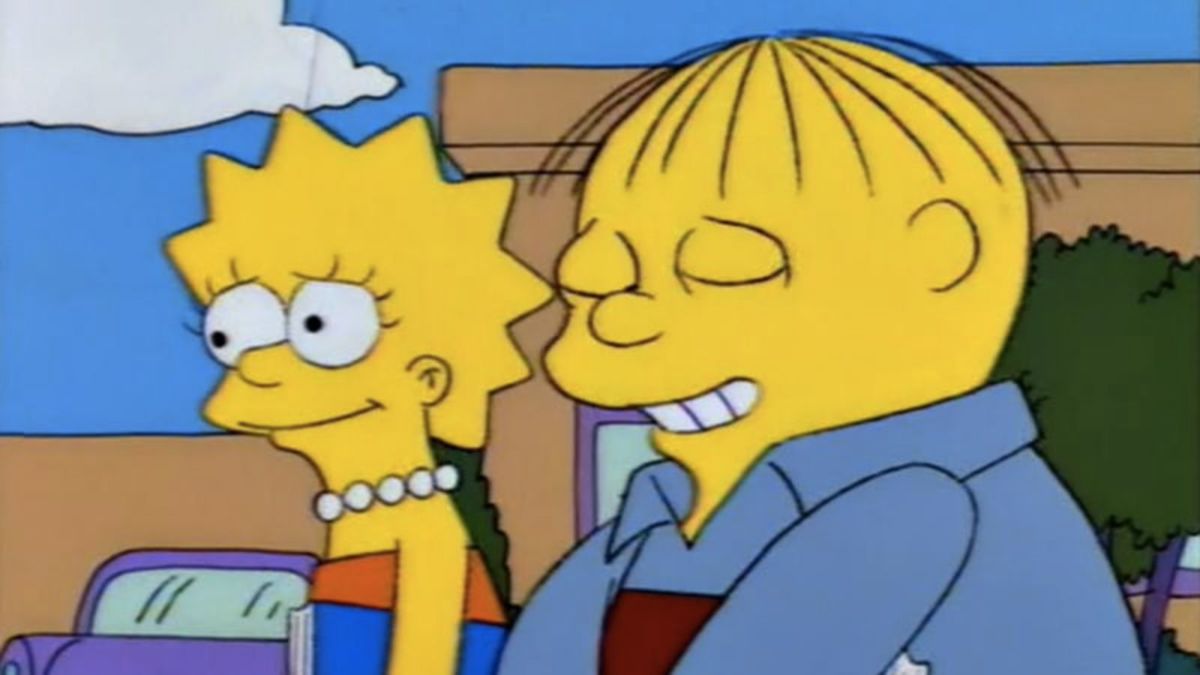
By Season 4 there had been a decent amount of focus on Bart’s classmates Milhouse, Nelson and Martin, but none on Lisa’s classmates, all minor characters at most. One of those minor characters was Ralph Wiggum, son of Chief Wiggum. In this episode, Lisa takes pity on a crestfallen Ralph and gives him a Valentine’s Day card. This leads to him deciding that he loves her and wants to marry her, which puts Lisa into a real predicament as she does not want to hurt his feelings. Ultimately they become friends, with Lisa recognising Ralph as caring, kind and genuine, with not a single bad bone in his body – a rare combination indeed.
In focusing on Ralph for the first time, The Simpsons ended up creating one of their all-time greatest supporting characters in this episode, who is among the most complex and multilayered characters. Ralph is established to be the class oddball, who is really imaginative and quirky, but highly unintelligent and mocked by his classmates and put down by Miss Hoover. Yet he has hidden depths – he is a real gentleman and also a phenomenal actor, giving a moving and powerful turn as George Washington in a school play. Full of hilarious one-liners, moments of poignancy and brilliantly expressive animation and voice acting, this is a wonderful episode that emphasises the importance of kindness and true friendship, which will leave you delighted to have Ralph as an established supporting character and friend to Lisa.
12. Season 4, Episode 17: Last Exit to Springfield
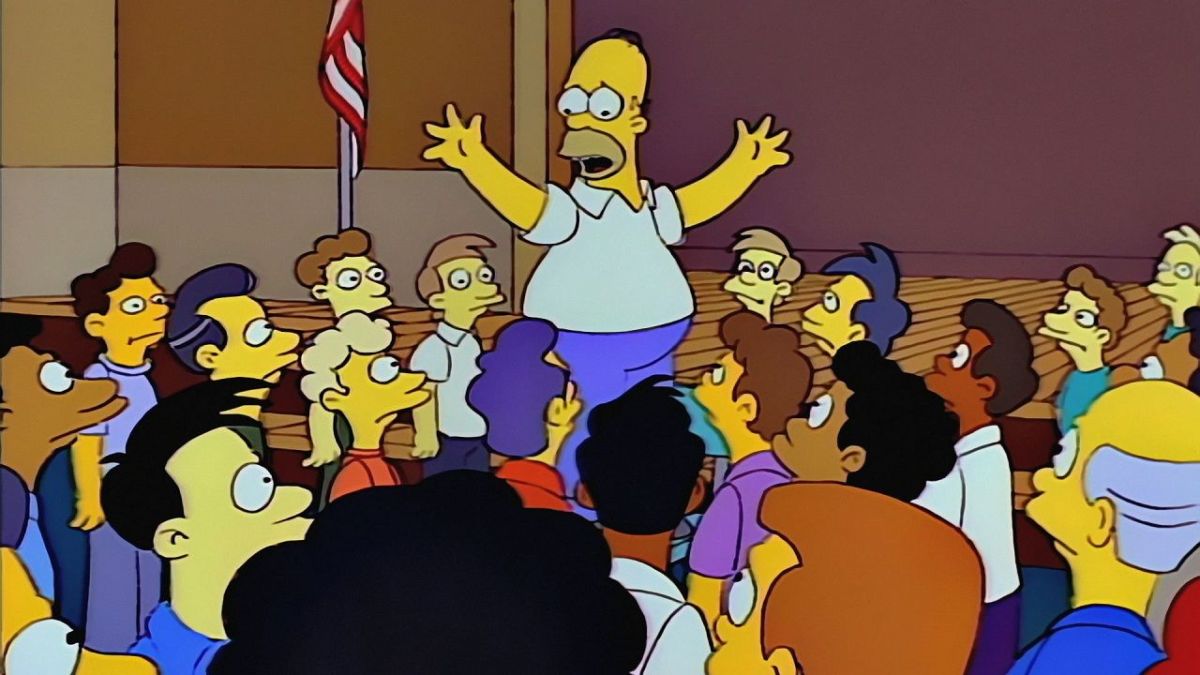
Last Exit to Springfield was born from the idea to depict the Nuclear Power Plant workers going on strike – given how uncaring for their wellbeing Mr. Burns is, who would blame them? What was originally set to be a general satire of union workers going on strike ended up also becoming one of the most serious episodes of the series up until that point and went on to be one of the best episodes of the entire series. The satirical edge is very much there – the Power Plant union workers initially plan to give up their dental plan in exchange for a keg of beer, a clever send-up of the stereotypical shortsighted self-interest of union workers that continues to resonate today, as unions still impact numerous people with their ill-conceived strikes.
However, the seriousness and gravitas of this episode is found in their strike. Last Exit to Springfield depicts Homer at his most serious, as he becomes Union President and leads the strike as no dental plan means the Lisa will not get the good quality braces that she so desperately needs but he cannot afford. The strike is ongoing and leads to an intense power struggle between Burns and Homer, but the message at the heart of this episode is weighty and is one designed to speak to many. The message is to stand up for your rights and not be willing to compromise, no matter the pressure that you are put under, and the episode as a whole also pays affectionate tribute to America’s blue-collar workers by emphasising just how vital they are to the country’s needs. As such, this episode is a prime example of something that The Simpsons does brilliantly – clever satirisation of American society that carries a weighty social commentary.
13. Season 5, Episode 2: Cape Feare
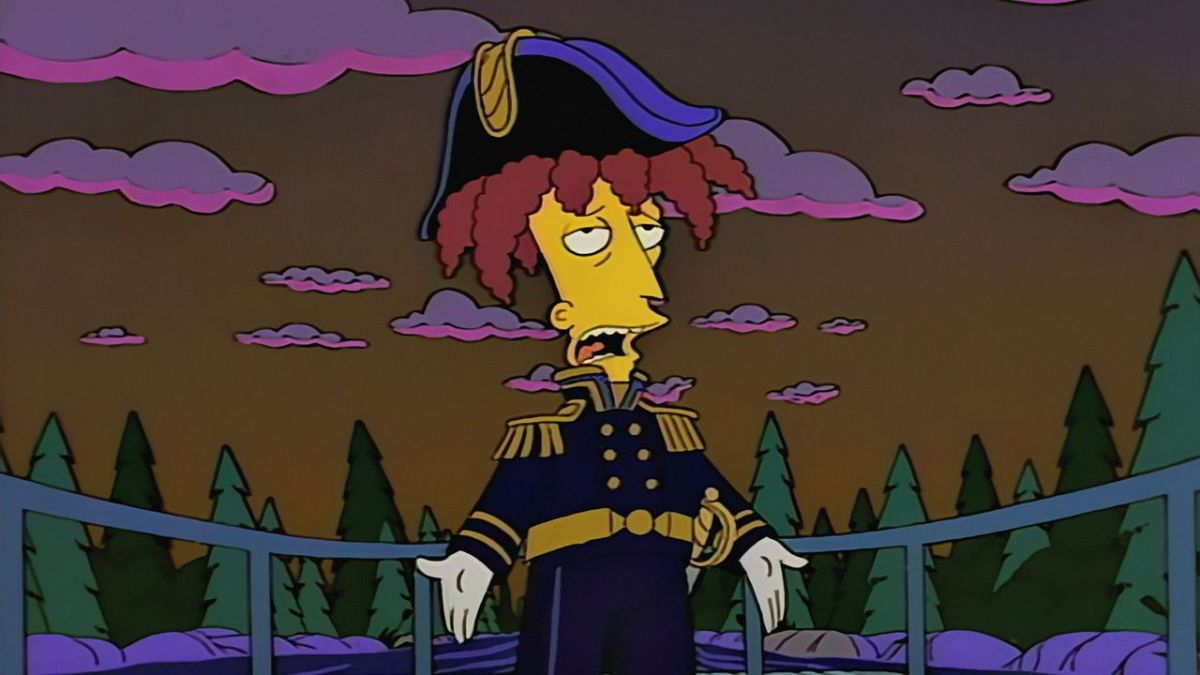
Sideshow Bob episodes are always among the highlights of their respective seasons, as the overly theatrical disgraced clown’s Sideshow is a brilliantly written antagonist. However, Cape Feare is the best of his episodes. In a terrific parody of the Cape Fear films, Sideshow Bob is released on parole and makes it his goal to murder Bart for foiling his previous schemes. The Simpsons enter the Witness Protection Programme and relocate to Terror Lake, but Bob is not an antagonist who can be escaped from that easily.
Boasting another wonderful guest turn from Kelsey Grammer as Sideshow Bob (whose rendition of the score from H.M.S. Pinafore is marvellous), Cape Feare is easily one of the series’ darkest episodes. It is not because it parodies intense psychological thrillers such as the Cape Fear films, or because of the excellent use of shadows and silhouettes by the animators, but because this is the episode in which Bob first made it his goal to kill Bart, and that is a rather dark subject matter indeed. Nevertheless, this is also a hilarious episode with some of the most absurdly brilliant slapstick of the entire series – Bob’s rough journey strapped to the underside of the Simpsons’ car, his suddenly getting trampled by a parade, but best of all is his failed attempts to navigate through a rake field. A solid minute of being hit in the face by rakes sounds preposterous, but the screenwriters and animators pulled it off, and it has become one of the most iconic slapstick gags of the entire series.
14. Season 5, Episode 3: Homer Goes to College
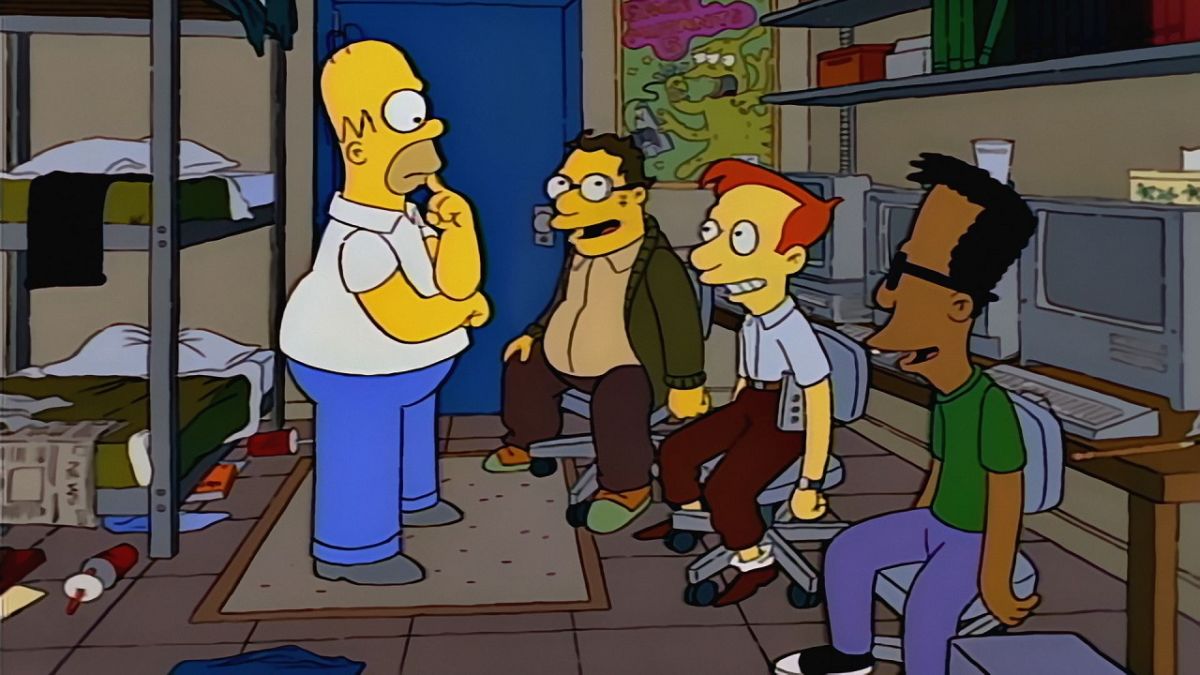
Homer’s incompetency at his job had never been denied in the series, but he somehow always clung onto it. That is until the Nuclear Regulatory Commission realise just how incompetent he is in an inspired moment where Homer somehow causes a nuclear meltdown without any nuclear materials to cause one with. To keep his job, Homer goes to college, but he is more interested in partying than studying, changing the lives of those he comes into contact with.
Homer Goes to College is a terrific satire of the college experience, offering hilarious send-ups of everything associated with a college campus. Fraternities, the supposed division between the jocks and nerds, the juvenility of 18-year-olds living away from home for the first time and a well-meaning Dean – it is all there, and the depiction of nerds is done very well and is highly amusing. This episode boasts consistent humour throughout this satire, and also has one of Homer’s all-time greatest lines as he burns his high school certificate – “I am so smart, I am so smart, S-M-R-T…uh, I mean S-M-A-R-T”, originally a blunder by voice actor Dan Castellaneta that got used anyway.
15. Season 5, Episode 10: $pringfield (Or, How I Learned to Stop Worrying and Love Legalized Gambling)
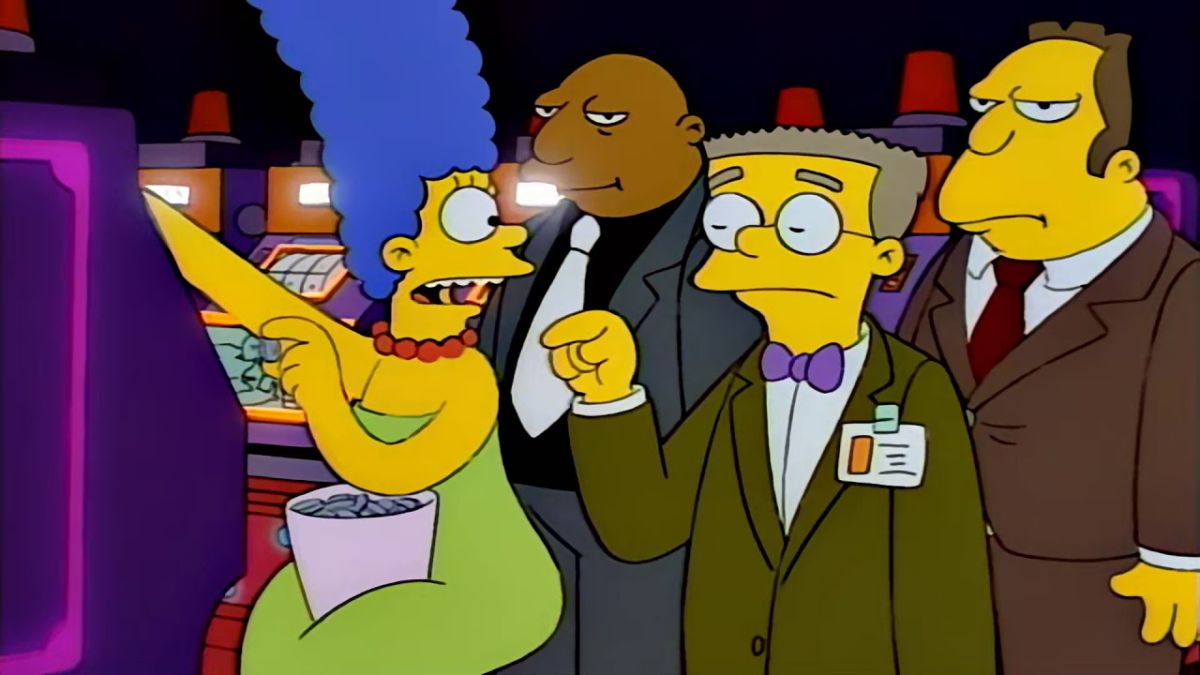
Mr. Burns has never been averse to owning establishments which cause harm to people – the well-being of the Nuclear Power Plant employees regularly testifies to this – so the concept of him opening a casino comes as no surprise. What does come as a surprise, however, is that it is Marge that becomes addicted to gambling rather than Homer. In other words, it is the level-headed and more serious Simpson parent, rather than the reckless one who has already been established to have addictive tendencies.
$pringfield is one of the most weighty, level-headed episodes of the entire series, as it gives the viewer a serious, sobering depiction of the dangers of gambling and just how easily a severe gambling addiction can develop. It is truly saddening to watch the Simpson matriarch descend further and further into gambling addiction, although most heartbreaking of all is the episode’s depiction of the impact which Marge’s neverending stay at the casino has upon the family, Lisa’s devastation at how her mother has let her down being a particularly poignant moment. That is not to say that there is no humour – Barney belching out quarters is a hilariously surreal moment, while Mr. Burns becomes a brilliantly written parody of real-life billionaire magnate Howard Hughes, but even these cannot change the fact that this is one of the series’ most dramatic and emotionally raw episodes of all-time.
READ NEXT: The Best Animated Movies You Should Watch
16: Season 5, Episode 15: Deep Space Homer
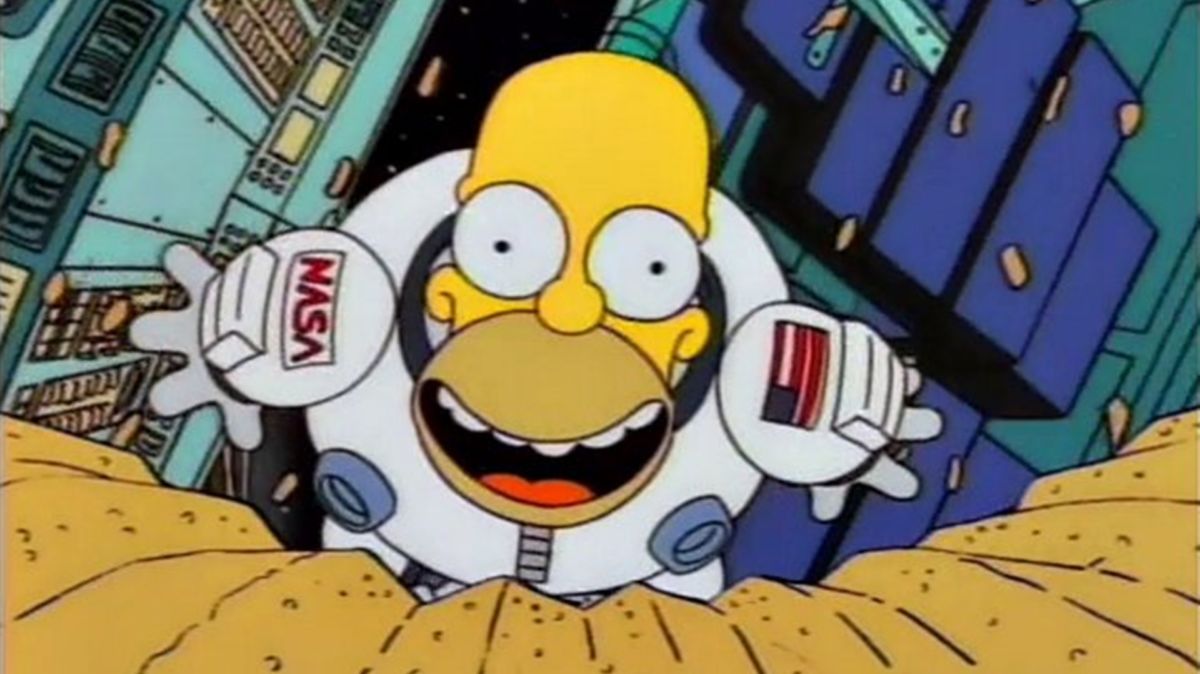
Outer space – a place millions dream of visiting but so, so few ever manage to do so. Many would love it if NASA announced that they were to send an “average shmo” into space, and that is precisely what happens in this episode. NASA decide to do this in response to declining Nielsen ratings, and Homer and Barney enter a competition to become that average shmo. Homer wins by default after Barney’s celebrations cause him to become unexplainably inebriated. However, Homer’s trip into space with two other astronauts (including Buzz Aldrin, voiced by the man himself) gets out of control when he sneaks a bag of potato chips on board.
Boasting several excellent 2001: A Space Odyssey parodies, the brilliantly animated Deep Space Homer is one of the most ingenious Simpsons episodes of all-time. It is a biting satire of television networks who will do anything for ratings and media coverage that blows silly things out of proportion (“It’s an inanimate carbon rod!”). The humour is consistently outstanding, from the energetic physical humour in Homer and Barney’s training in the competition, to the brilliant moment where Homer realises that Planet of the Apes was set on Earth, to Homer’s zero-gravity feasting on floating potato chips, it is laugh-out-loud hilarious and, at times, visually absurd.
Buzz Aldrin is also a great guest star, even managing to make a line as simple as “Careful – they’re ruffled” highly amusing. A quarter-century and nearly 600 episodes have happened since, but this episode is still regarded as one of the all-time great Simpsons episodes, which is further testified to by the fact that Edward Lu requested that a copy be placed on the International Space Station for the astronauts’ entertainment.
17. Season 5, Episode 19: Sweet Seymour Skinner’s Baadasssss Song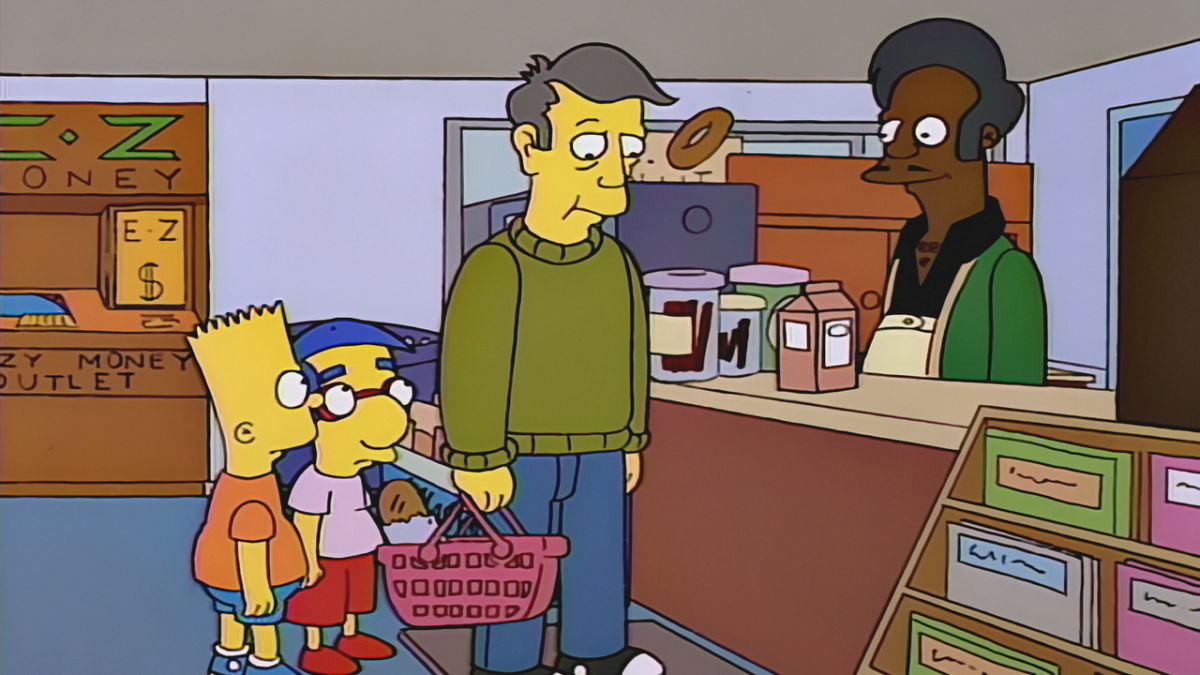
This episode served as the first of many milestone episodes for the series, as this was the hundredth episode of The Simpsons. To mark 100 episodes, Matt Groening and the writing team chose to develop further a significant dynamic which had always been somewhat surface-level – Bart and Principal Skinner. After a brilliantly self-aware chalkboard gag in the opening credits, Bart takes Santa’s Little Helper to show and tell, which serves as the catalyst for the episode. A series of mishaps subsequently occur which lose Skinner his job, and afterwards he and Bart become friends, with the latter eventually trying to get Skinner his old job back (partly out of a sense of guilt).
A brilliantly written episode, this features everything that one would expect from an all-time great Simpsons episode. Willie’s pursuit of Santa’s Little Helper through the school air vents has real energy and terrifically parodies Alien, while also boasting just some of many hilarious slapstick gags found throughout this episode. There are absurdly brilliant stereotypes – Apu has an extended cameo, while Italian restaurateur Luigi is introduced in this episode. But, most importantly, there is character focus and development.
Skinner becomes a much more rounded character in this episode, as his firing sees him become a broken man who feels a lack of direction in life, thereby being far more vulnerable than in his previous appearances, and this is the point where viewers really invested in him for the first time. Plus, the fleshing-out of his dynamic with Bart is really well done. They have a great friendship, but it becomes clear that they value and miss each other as enemies, the nuances of their dynamic being established and this episode cementing it as one of the best dynamics of the entire series.
18. Season 6, Episode 1: Bart of Darkness

The Simpsons is no stranger to parodies (the Treehouse of Horror tradition testifies to that), and they have executed a number of them very successfully. For the Season 6 premiere, the writers opted to parody what is considered to be among the all-time great films – Alfred Hitchcock’s Rear Window. After breaking his leg while trying to jump from the treehouse roof into the new swimming pool, Bart spends the summer recuperating in his bedroom while watching the world through Lisa’s telescope. However, he soon finds reason to believe that Ned Flanders has killed his wife Maude, but without concrete evidence he cannot go to the police.
The Simpsons had done intense drama on multiple occasions, but this was easily one of the darkest ones to date, as the subject matter is murder, and one which causes the viewer to spend most of the episode terrified that beloved supporting character Ned has taken an unspeakably dark turn. The animation is excellent, from the brilliantly choreographed sequence where Lisa revels in being Queen of the Pool, to the use of silhouettes that leave the viewer fearing that Ned may actually be capable of murder. The final outcome is wholly logical, rather amusing and quite a relief, but that does not change the fact that this episode can be seen as the moment that heralded in an era where The Simpsons would have darker subject matter in their self-contained storylines. Hitchcock fans will be especially pleased by James Stewart’s character Jeff from Rear Window having an animated cameo. However, Rear Window’s voyeuristic themes are not homaged through Bart’s use of a telescope, but by Chief Wiggum’s spying on Homer and Marge skinny dipping from a Police helicopter, his subsequent interruption of their fun being hilarious.
19. Season 6, Episode 8: Lisa on Ice
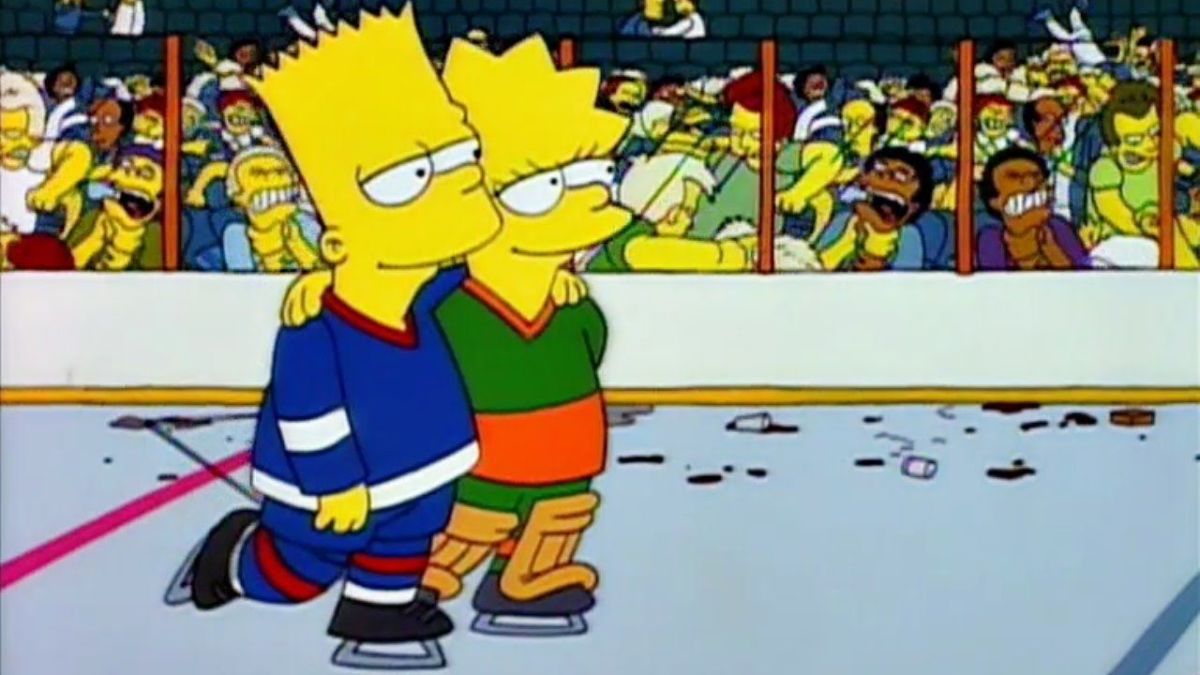
Lisa Simpson has been treated as a child prodigy since day one, while her in-depth moral compass and political views have been recurring themes since Season 2. Never has she been depicted as genuinely bad at anything. However, in a nice nod to the stereotypical differences between nerds and jocks, it is revealed that she is failing Gym class, before later discovering her talent as an ice hockey goalkeeper and becoming a formidable player. Lisa and Bart now play on different pee-wee teams, leading to a tense rivalry that culminates when their teams face off against each other.
To depict Lisa as facing the prospect of failure teaches younger viewers especially that it is impossible to be good at everything – yes, Lisa becomes a formidable hockey player, but that is after she proves awful at every other sport. Furthermore, Lisa on Ice emphasises just how important academic abilities are to Lisa, while to depict her as aggressive adds an interesting new side to the character. The episode is very well-paced, with a faster and more intense pace given to the ice hockey scenes, while Lisa’s heated rivalry with Bart transcends its intensity to explore just how deep-rooted their love for one another actually is. There is also some excellent humour in this episode – Homer’s childishness and buffoonery are both displayed brilliantly (in his efforts to towel-whip Uter and his failed attempt to “accidentally” eat a pie respectively), and there is also an all-time great Ralph Wiggum quote (“Me fail English? That’s unpossible!”).
20. Season 6, Episode 13: And Maggie Makes Three
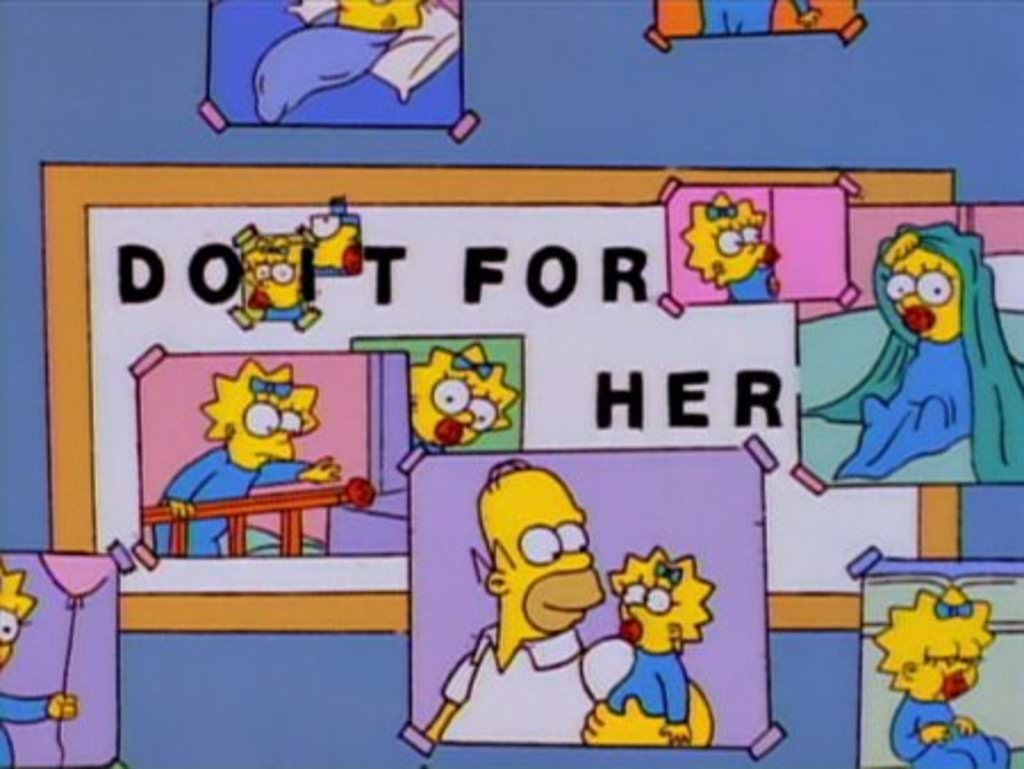
The Simpsons have done multiple flashback episodes over the years, the focus of the narrative being a reflection on the past that Homer and Marge are telling the kids. These are regularly among the stronger episodes of a Season, with And Maggie Makes Three being one of the strongest flashback episodes (along with Lisa’s First Word). Homer tells the family of how he had finally been able to afford to quit working at the Nuclear Power Plant and take his dream job at Barney’s Bowlarama. However, Maggie’s impending birth meant that he had to return to the better salary but utterly depressing working environment at the Power Plant.
There are some terrific visual gags in this episode, with Homer playing Mr. Burns’s head like a bongo and putting his bald head in the ball-buffer being absurdly brilliant highlights. However, few episodes boast such rich character-driven drama as this one. One cannot help but feel heartbroken for Homer when he is forced to return to the Power Plant. Tears of sadness ultimately become tears of happiness however, as the most touching moment comes at the end when it is revealed that looking at photos of Maggie gives Homer the motivation that he needs to stick it out at the Power Plant, reminding him to “Do it for her”. Homer and Maggie’s relationship has never been explored so sensitively and with such genuine heart since.
READ NEXT: Best Modern Western Movies You Should Watch
21. Season 6, Episode 18: A Star is Burns
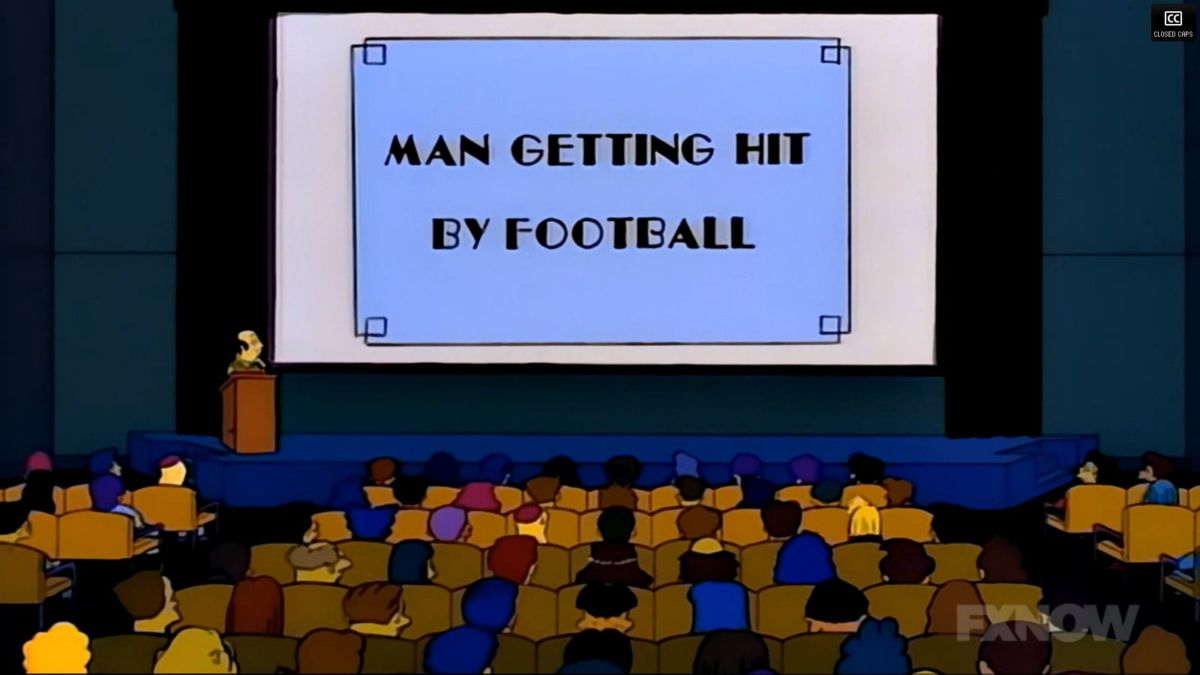
Crossover episodes can be tough to pull off, particularly if the crossover is central to the narrative, but A Star is Burns does it tremendously well. In order to bring a bit more culture to Springfield, the town hosts its first ever local film festival, with various residents making short films, and Jay Sherman – main character of The Critic – coming to be a judge. This is a great crossover due to the fact that there is some brilliantly self-aware screenwriting, and Sherman integrates well into Springfield, a charming character who is the catalyst for some great gags revolving around Homer’s sense of inadequacy and Patty and Selma’s love for MacGyver.
As for the film festival itself, ‘Man Getting Hit By Football’ uses Hans Moleman for unvarnished and unashamed slapstick. However, the heartbreaking ‘Pukahontas’ is a raw, personal piece by Barney that shows his deepest and most sensitive feelings towards his alcoholism, a poignant moment in the series that cements the fact that there is more to Barney’s character than the joke that he exists for. Plus it was very satisfying to see Mr. Burns be shown that money cannot buy everything. Interestingly, Simpsons creator Matt Groening publicly opposed the episode due to it being a crossover. His disdain for it feels misguided, however, as not only is it a great crossover, but it is a great episode in its own right.
22/23. Season 6, Episode 25/Season 7, Episode 1: Who Shot Mr. Burns?
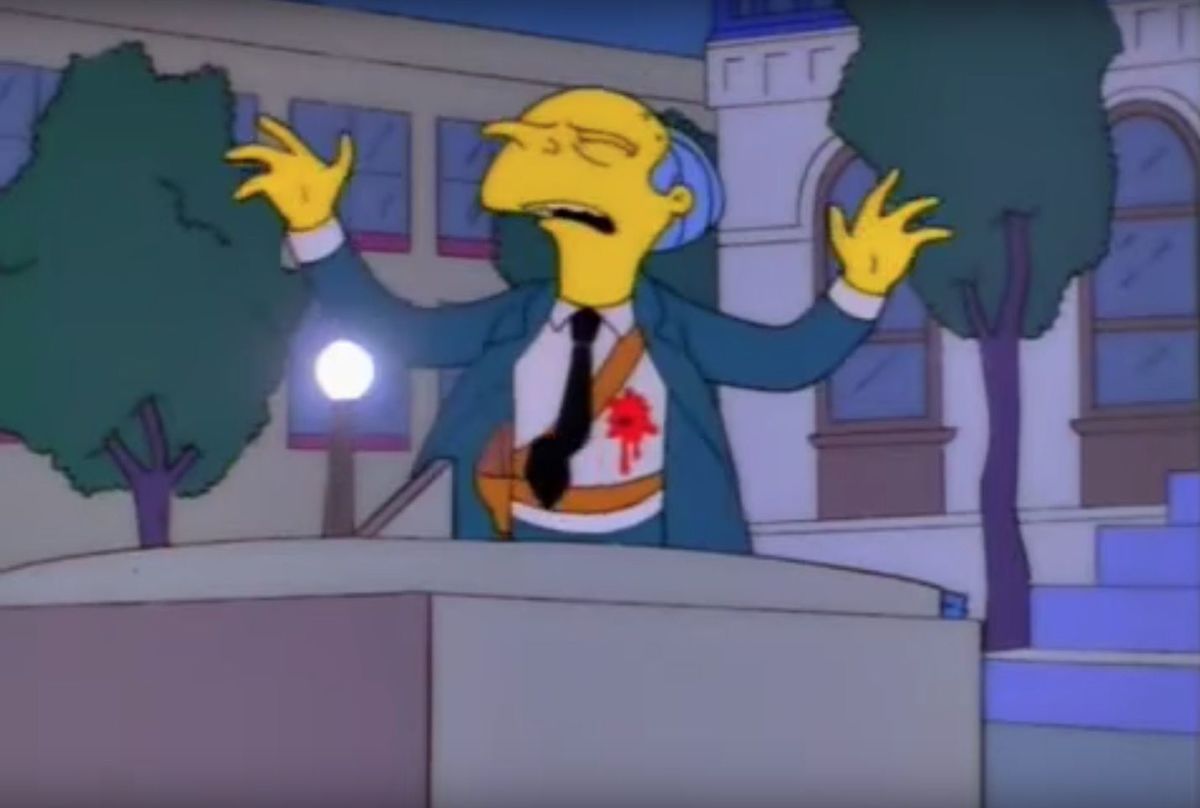
The Simpsons’ first ever two-parter, with Part One also having the series’ first cliffhanger ending, Who Shot Mr. Burns? features some of the most detailed writing of the entire series, which gave viewers a very clever attempted murder mystery, which they piece together alongside Chief Wiggum and Lisa. Over the course of Part One, Burns is shown at his most ruthless, as his siphoning of oil discovered underneath Springfield Elementary impacts countless citizens. This is just the start though, as he malevolently blocks out the sun, leaving Springfield basked in permanent darkness. By the time he is shot by a mystery assailant at the end of Part One, he has angered the entire town, the list of characters with motivation to shoot him including Homer, Bart, Grampa, Smithers, Principal Skinner, Moe, Barney, Willie, and (guest star) Tito Puente.
Part Two presents the solving of the mystery, which is done very cleverly, with each piece of the puzzle having real significance to it. With so many favourite characters being suspects and Lisa being just as determined to solve the mystery as Wiggum, the viewer cannot help but feel invested in piecing the puzzle together, a testimony to how well the writing team had established the residents of Springfield over the years. The final reveal comes as a brilliant surprise, which foreshadows the firearm proficiency that Maggie would use to her benefit in future seasons, and along the way there are terrific pop-culture references to Basic Instinct and Twin Peaks.
24. Season 7, Episode 5: Lisa the Vegetarian
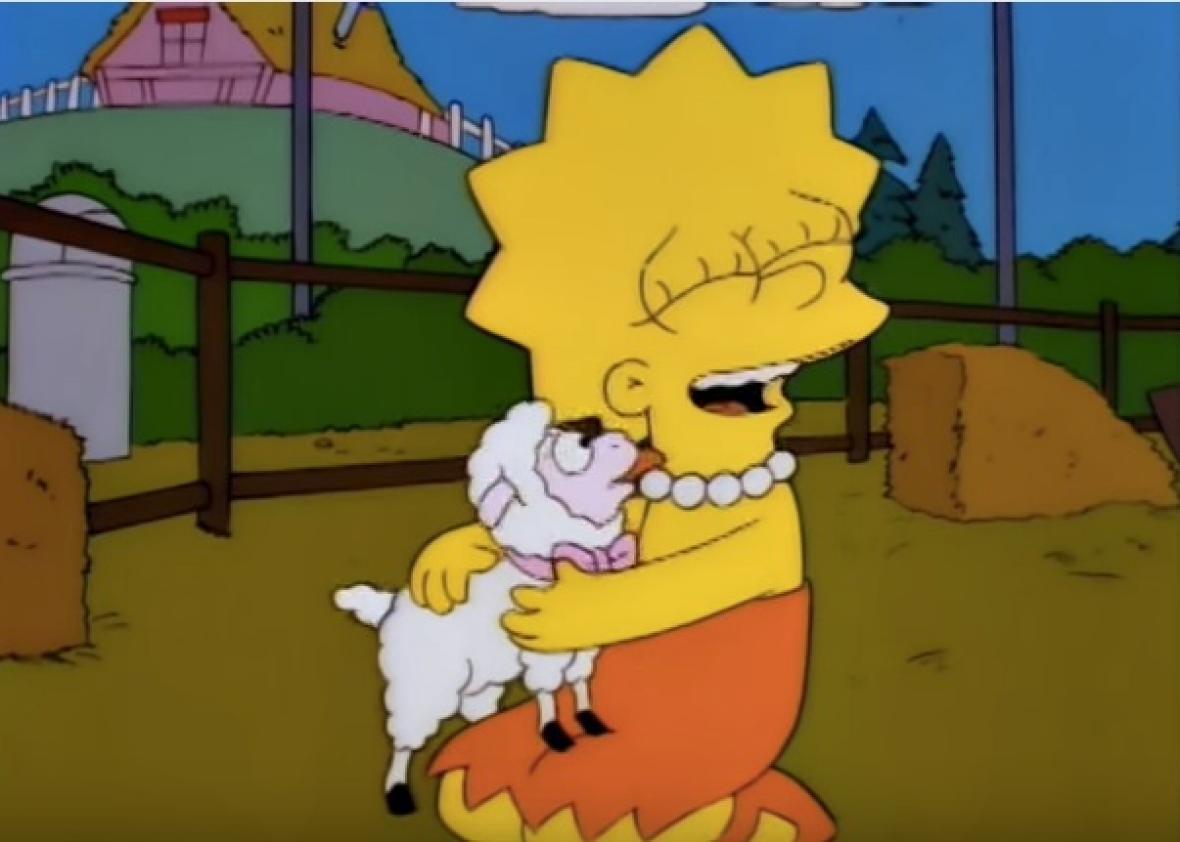
Earlier seasons had established Lisa as a principled, if slightly opinionated 8-year-old, who was far more sensitive than her father and older brother, and felt that her academic excellence was wholly unappreciated. In Lisa the Vegetarian, the middle Simpson child decides to become a vegetarian following a trip to a petting zoo. Mortified by everyone else’s devouring of meat, she ruins Homer’s barbecue, before later gaining an important lesson from Paul and Linda McCartney (a lovely if brief cameo).
Boasting sharp and witty dialogue, notably in the teasing Lisa receives for her new dietary choice (try watching this episode without getting “You don’t win friends with salad” stick in your head), and some great physical comedy (Homer’s frantic attempt to save the pig-de-resistance is hilarious), this is one of the finest Lisa-centred episodes. One has to respect her for standing up for her principles in the face of oppression but, like so many previous such episodes, she learns humility and becomes closer to her father as a result. The latter comes in the important life lesson that Apu gives her and, by extent, us the viewers – that it is okay to have your opinion, but you must be willing to respect the opinion of others and not force them to conform to yours.
25. Season 7, Episode 8: Mother Simpson

By the time that Mother Simpson aired in November 1995, the series had been running for six years and over 130 episodes, yet we had had no definite answer on where Homer’s mother was, meaning that most fans just assumed that she had died, given that she did not feature in flashbacks to Homer’s teens. That is actually what Homer thought too, having been told by Grampa that she died one night during his early childhood when he was at the cinema. However, his long-lost mother returns to Springfield to visit Homer’s grave after he fakes his death to get out of working on a Saturday (a hilarious slapstick sequence that opens the episode). After a joyful reunion, it transpires that Mona (voiced with real maternal warmth by outstanding guest star Glenn Close) has been on the run for 27 years, after her activism efforts went too far in the late 1960s.
Mother Simpson is one of the series’ finest blends of brilliant humour and rich, character-driven drama. Following Homer’s hilarious faking his own death and his reunion with Mona, the family gets to know her, with Grandma Simpson bringing a new aspect to the familial dynamic. Homer reverts back to a small child, trying to impress his mother by walking on his hands and showing her his bedroom in two highly amusing moments. Those moments ultimately emphasise the need which Homer has had since childhood, yet never acknowledged – the need for the unconditional love of a mother, and seeing how much Mona loves him makes the flashback to the moment where she had to leave Homer and go on the run even more poignant. Yet even that is not even the most poignant moment in this heartbreaking, yet beautiful episode – try to keep a dry eye when Mona is forced to go on the run again and she and Homer share a heartfelt goodbye.
READ NEXT: Best Body Horror Movies To Squirm Your Way Through
26. Season 7, Episode 11: Marge Be Not Proud
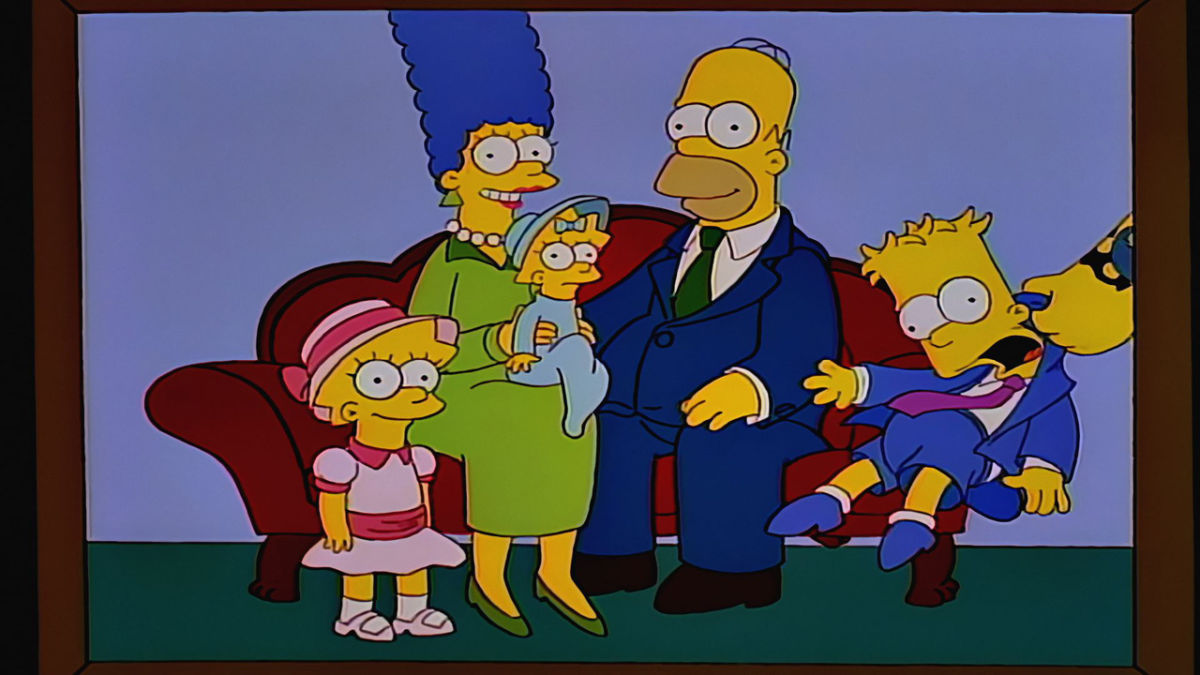
Ah, Christmas. ’Tis the season of good will, the season to be jolly, the season to…get caught shoplifting!?! Marge Be Not Proud is not your typical sitcom Christmas special – after Bart is caught shoplifting (to get the newest, coolest video game no less) it looks like he has ruined Christmas as, despite his best efforts to prevent it, Marge finds out and is absolutely crushed, while Bart is left feeling rotten to the core. While Homer berates Bart before (after losing his train of thought) telling him to “stay out of my booze”, Marge is so disappointed that she sits in silence, unable to even look at her son.
It is not just the poignant screenwriting that makes Marge’s disappointment with Bart so heartbreaking to watch, but the animation itself. Few episodes truly testify to just how expressive the animation is, and watching Marge’s face change from anger at what she considers false accusations to horror, sadness and ultimately disappointment as she sees the truth on CCTV is such a harrowing moment thanks to the detail in her gradually changing facial expression.
The gravitas of the situation is further expressed in just how rotten Bart subsequently feels, relatable for any viewer who knows the crushing feeling that comes with disappointing a parent. It is not all tears and gloom though – the final scene where Bart atones for his mistake (following a very clever red herring) is absolutely heartwarming and exemplifies better than any other moment in the series that Bart is (at his core) a good kid, whose bond with his mother is one of unconditional love.
27. Season 7, Episode 17: Homer the Smithers
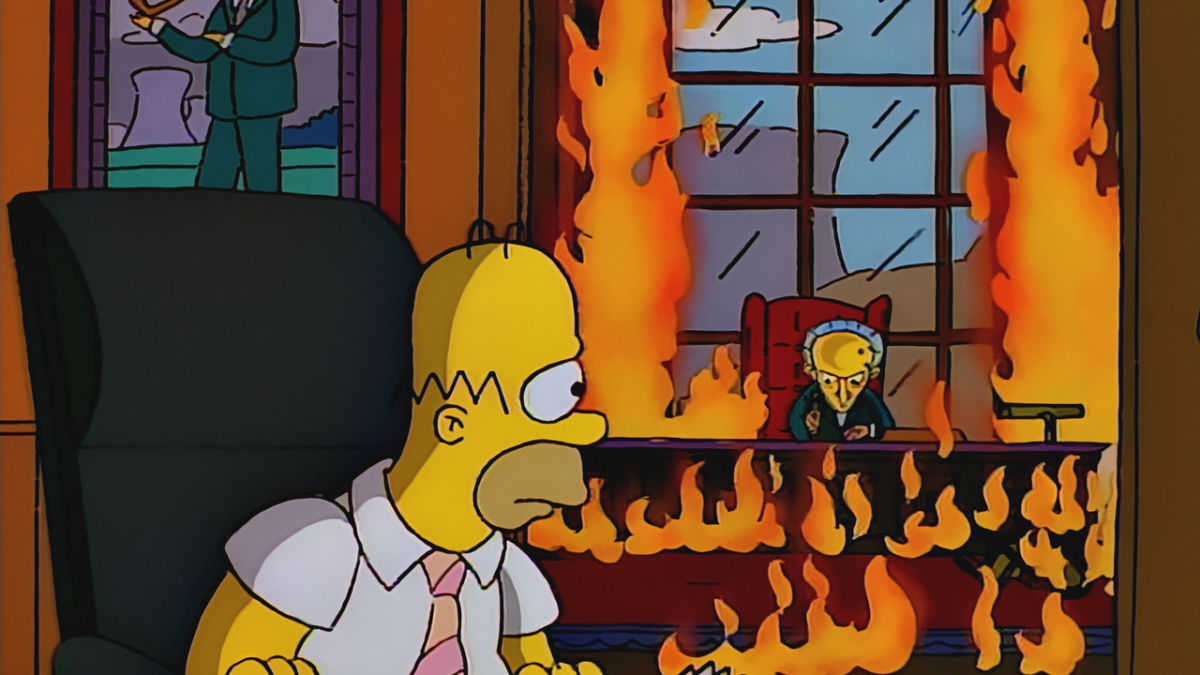
Following a bit of a nervous breakdown, Smithers heads off on vacation to a male-only island resort (an inspired addition to the running gag about Smithers’s unspoken sexuality). Determined for Mr. Burns to realise how much he needs him, he hires the incredibly incompetent Homer to be his temporary replacement. Homer’s incompetency and Burns’s utter dependence on him causes the Simpson patriarch to assault Burns, but this turns out to be a blessing for the latter, who learns to become independent again in the aftermath.
Until we see Burns call Homer to his manor in the middle of the night to answer the phone, we do not quite realise how truly dependent on Smithers he is. With that being established, watching Burns become independent and, in doing so, become a happy man is an altogether very enjoyable transformation to watch. However, that does not change the fact that Homer the Smithers is among of the most laugh-out-loud hilarious episodes of the series. Homer’s efforts to do a good job result in some brilliantly absurd moments which prove that some people cannot even be trusted with cereal, and some very witty dialogue in his interactions with Burns (“Is it about my cube?”). Ultimately it all culminates in a terrifically choreographed slapstick sequence that serves to undo the events of this episode, resetting in time for the next, as you do.
28. Season 8, Episode 2: You Only Move Twice
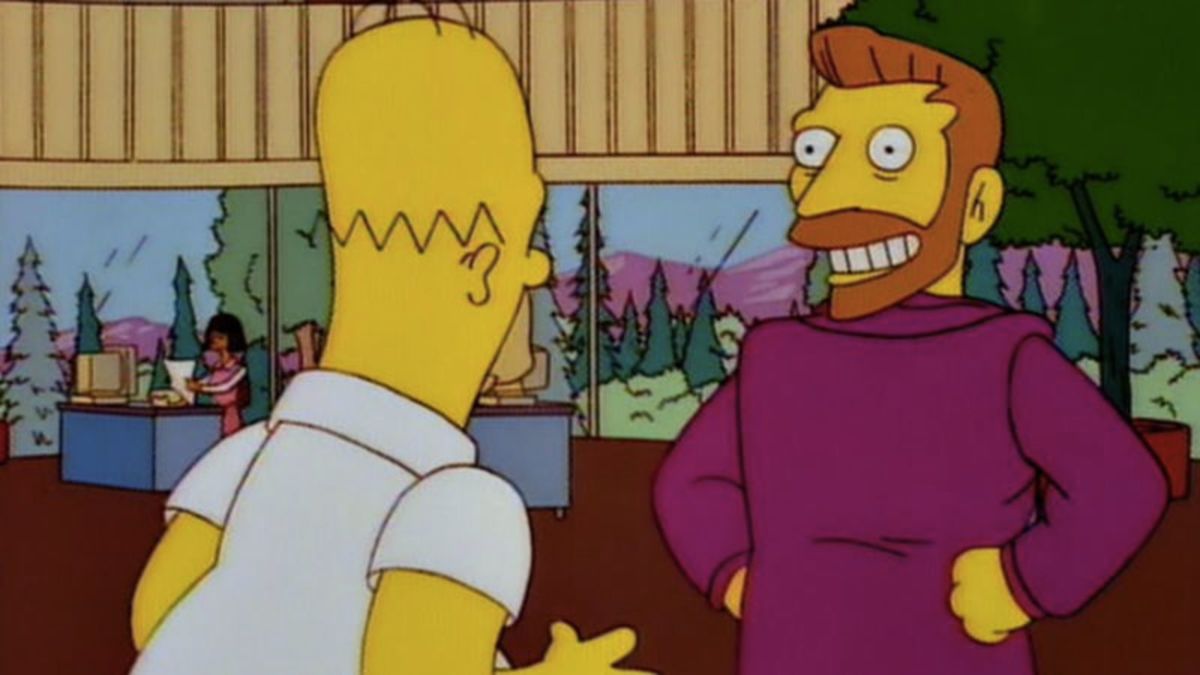
Despite the title being a reference to the Bond film You Only Live Twice, and the episode making several references to the franchise, including a terrific parody of the iconic laser scene from Goldfinger, this is very much a Homer-focused episode. The family moves to Cypress Creek after Homer is offered a new job at the Globex Corporation. Homer excels at his new job, which he loves, and finally has a dream boss in Hank Scorpio, who motivates him, encourages him and treats him like a friend rather than an underling. Marge and the kids, however, end up hating Cypress Creek for differing reasons, and Homer must accept that he may well have to give up his perfect job for their sake.
You Only Move Twice is often cited among the best Simpsons episodes of all-time and it is not difficult to see why. The screenwriting is consistently sharp and witty, not just in the Bond references, but in the interactions between the characters – a solid early example being Marge arguing against leaving Springfield because “Bart’s lawyer is here” – and there is also a good sense of energy to this episode. However, the brilliance of this episode is in Hank Scorpio, the best character that recurring guest star Albert Brooks has ever voiced for the series. Hank is a really charismatic character and a great boss, whose view of that term is best illustrated when he says “I’m just like you. Oh, sure I come later in the day, I get paid a lot more and I take longer vacations, but I don’t like the word ‘boss’.” However, despite seeming too good to be true, you do not see the twist of him being a Bond-style criminal mastermind coming, and Brooks portrays the character’s maniacal streak marvellously. The testament to the strength of the characterisation, however, comes through most in the fact that, despite this, you cannot help but love Scorpio and want Homer to continue working for him. Heck, how many other one-off characters got their own end credits song?
29. Season 8, Episode 10: The Springfield Files
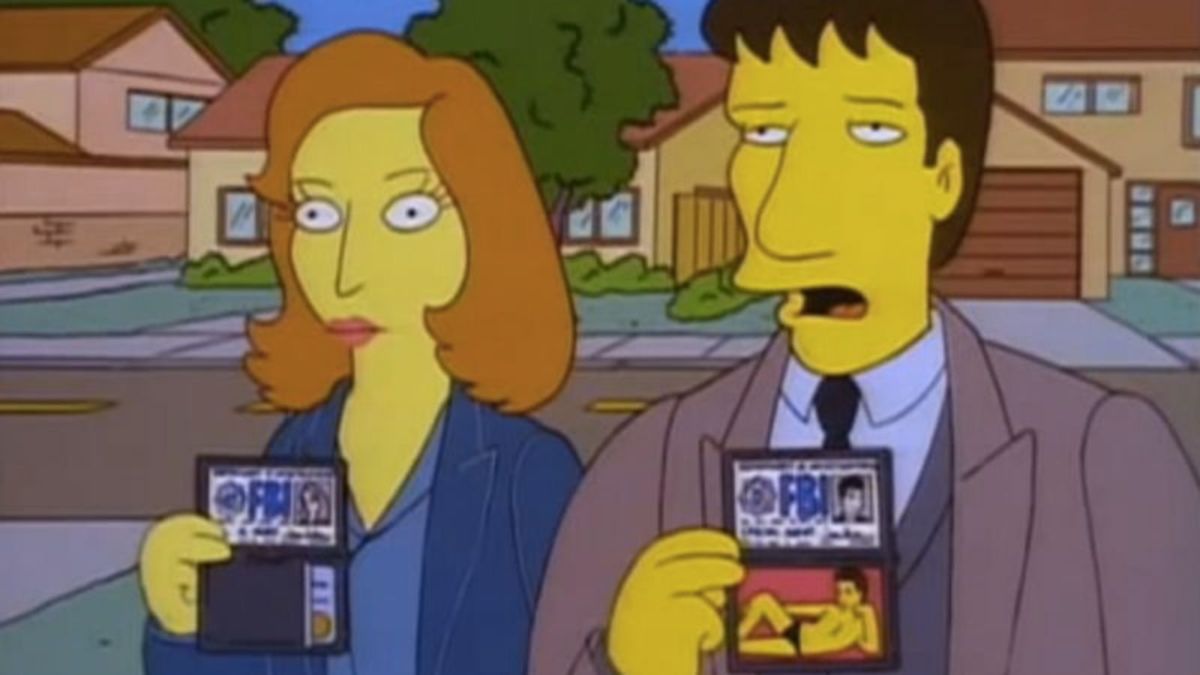
By January 1997 the two most popular series on Fox were The Simpsons and The X-Files, so naturally it made sense for the two to have a crossover episode (which Matt Groening has never spoken out against, unlike the crossover with The Critic), with David Duchovny and Gillian Anderson reprising their roles as Agents Mulder and Scully. When a drunken Homer takes a shortcut through the woods to get home from Moe’s one night, he sees an alien. Nobody believes him, but before long FBI Agents Mulder and Scully hear about the sighting and come to investigate. It soon transpires that there may be some legitimacy to Homer’s claims, but nobody can be quite prepared for the final answer in the search for the truth.
Tonally The Springfield Files is the perfect combination of both series. It is an eerie episode with a visually eerie quality to the dark woods, with The X-Files’ theme playing when the alien appears, while there is also great energy and wit to the narrative’s humour. Homer’s reactions to the surreal alien boast great energy and absurd comedy, while his reference to the film Speed is very amusing. The episode is not just a great crossover but a great satirisation of man’s relationship with the unknown, depicting some who are open to the idea of an alien but others who ridicule it. At the end of it all is (of course) resolution and a “logical” explanation, which boasts some of the most absurd and surreal animation of the series, and emphasises Lisa’s logical approach to everything and Mr. Burns’s desires for immortality.
30. Season 8, Episode 18: Homer vs. the Eighteenth Amendment
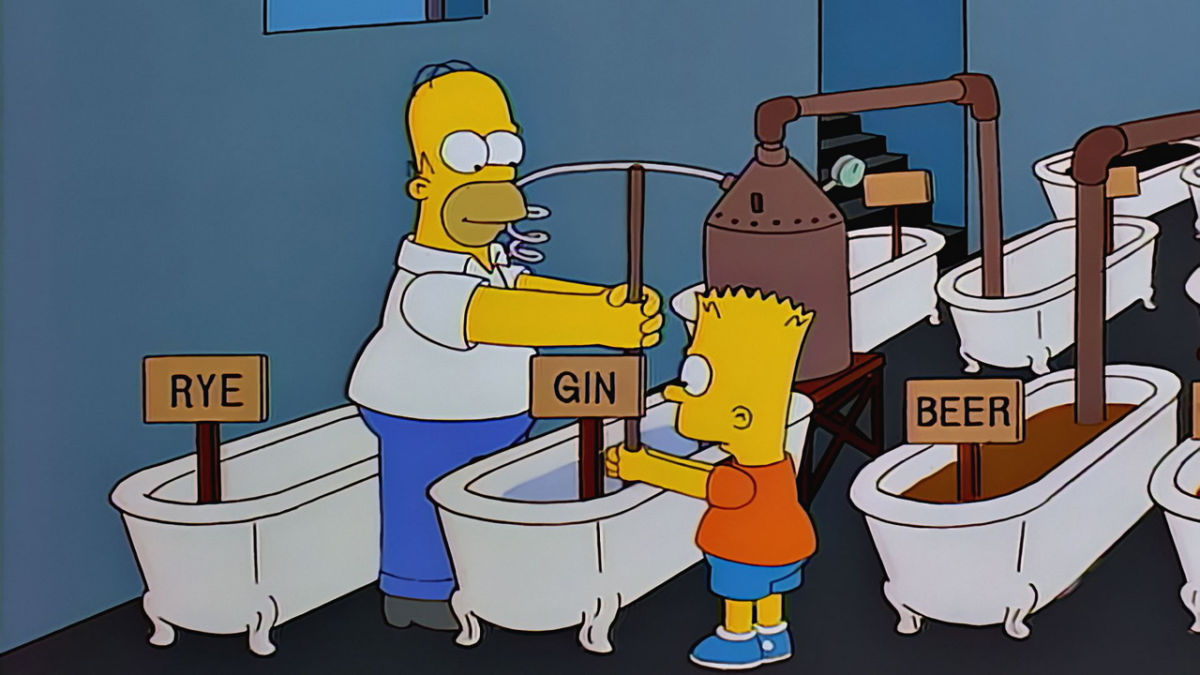
The Simpsons is no stranger to paying homage to classic cinema and Homer vs. the Eighteenth Amendment is a very fine example of this, homaging the Pre-Code crime films of the early 1930s. After Bart gets drunk at the St. Patrick’s Day parade, Mayor Quimby is forced to implement an ancient Prohibition law in Springfield. Homer, however, illegally acquires alcohol and supplies Moe’s Tavern under the alias of “The Beer Baron”. With Chief Wiggum unwilling to do anything and getting caught drunk on the job, the town gets a new chief – Rex Banner, who is determined to catch the new legendary bootlegger.
This is an outstanding homage to Pre-Hayes Code crime films, featuring everything that cinephiles would look out for. There’s a criminal who you root for in spite of their illegal activities (Homer), Police chases, machine gun fire, mobsters (Fat Tony and his henchmen), and a law enforcer dressed in a three-piece suit and fedora trying to get to the bottom of it all (Banner looks like he has stepped straight out of a 1930s’ film). Yet this is not actually that dark of an episode, unlike those old James Cagney and Edward G. Robinson films, boasting some absurdly brilliant and quite light-hearted gags throughout – Homer’s efforts to mix his own spirits being a particular highlight. However, the real brilliance of this episode is depicting Homer showing a real stroke of genius in his methods to get the alcohol to Moe in arguably his most cunning plan of all-time, meaning that even Homer’s least enthusiastic fans cannot help but root for him.
Some of the coverage you find on Cultured Vultures contains affiliate links, which provide us with small commissions based on purchases made from visiting our site.
